
16.2 UNIVERSITY GOVERNANCE MEASURES
1. Related information on our university having elected representation on the university’s highest governing body from.
King Mongkut’s University of Technology Thonburi (KMUTT) ensures inclusive, transparent, and participatory governance by providing elected representation on its highest governing body, the University Council. The University Council is the supreme governing authority responsible for setting institutional policies, approving strategic plans, overseeing academic and administrative affairs, and ensuring accountability across all university operations.
As part of KMUTT’s commitment to democratic governance and shared decision-making, the University Council includes members elected from key internal constituencies, ensuring that voices from within the university community are formally represented. These elected groups typically include:
Elected faculty representatives from academic schools and departments
Elected staff representatives from administrative and support units
Elected student representatives who contribute perspectives on academic quality, student welfare, and campus development
The inclusion of elected representatives ensures that decisions at the highest level reflect diverse viewpoints and are responsive to the needs of the university community. This governance structure strengthens transparency, promotes checks and balances, and supports fair and equitable policy formulation across academic, financial, and operational matters.
KMUTT’s statutes and regulations formally outline the selection process, term duration, and responsibilities of elected representatives, ensuring a structured and accountable governance process. Through this system, the university demonstrates its commitment to inclusive leadership, participatory decision-making, and the continuous improvement of institutional governance aligned with global standards.
2. Students’ union
KMUTT Student Organization Administration Organization
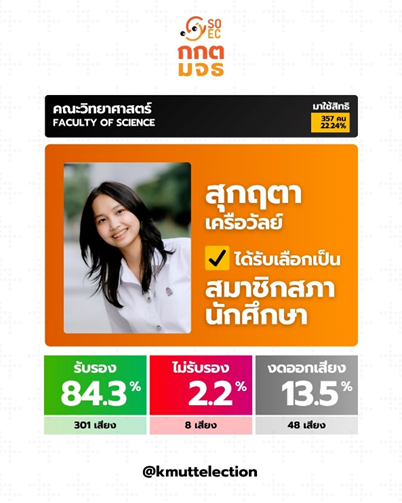
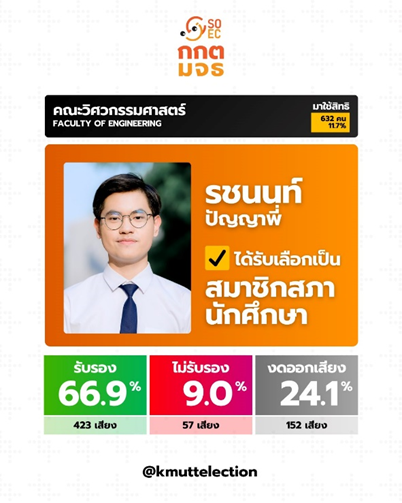

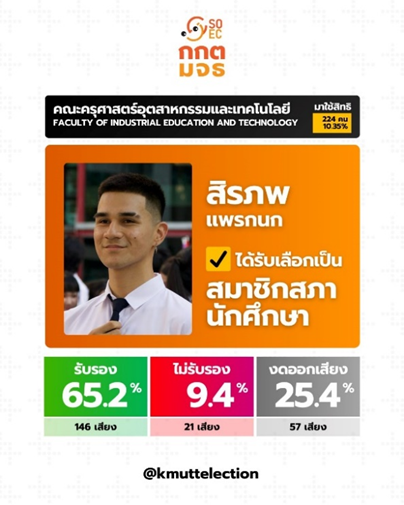
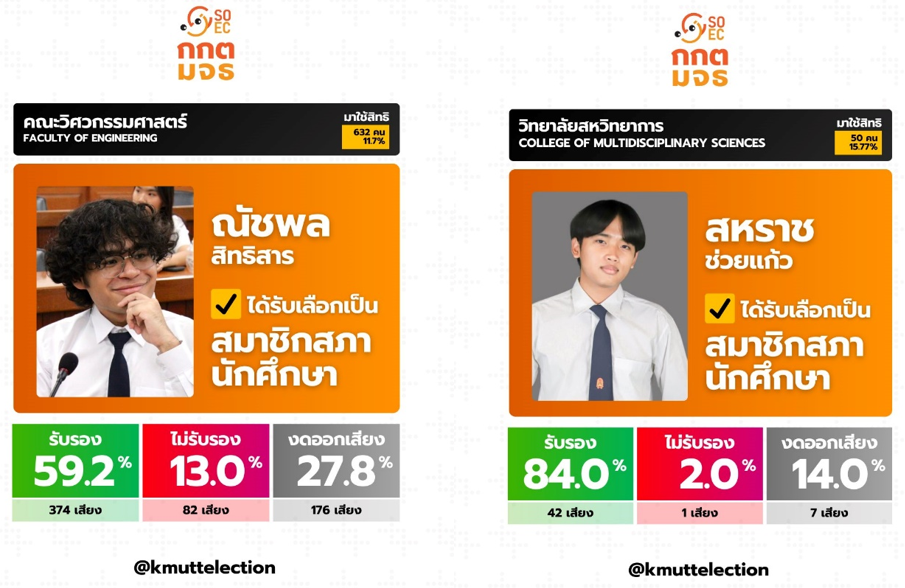
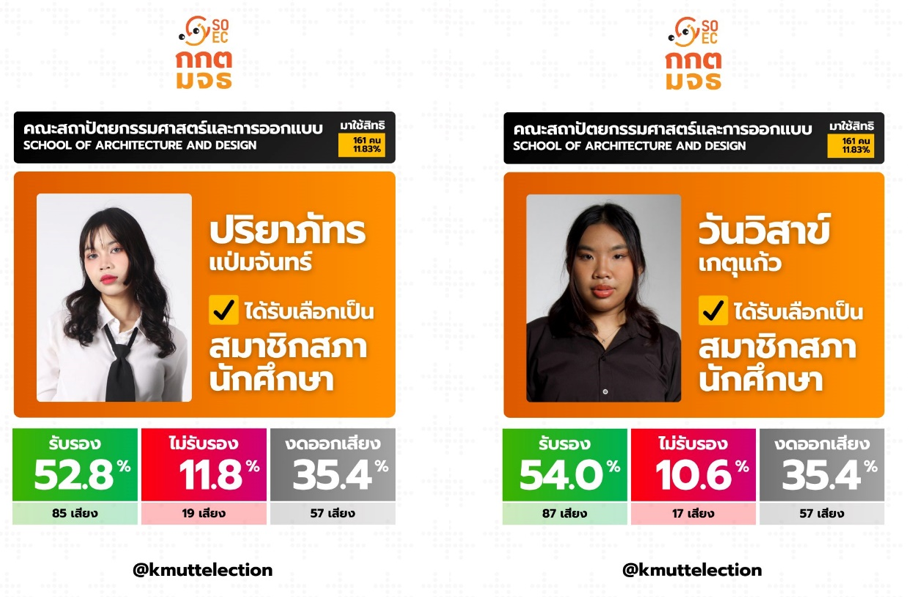

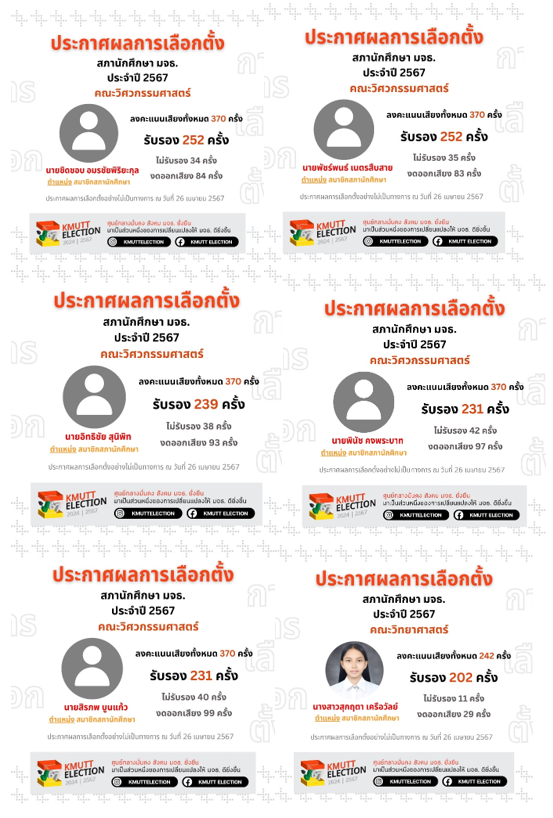
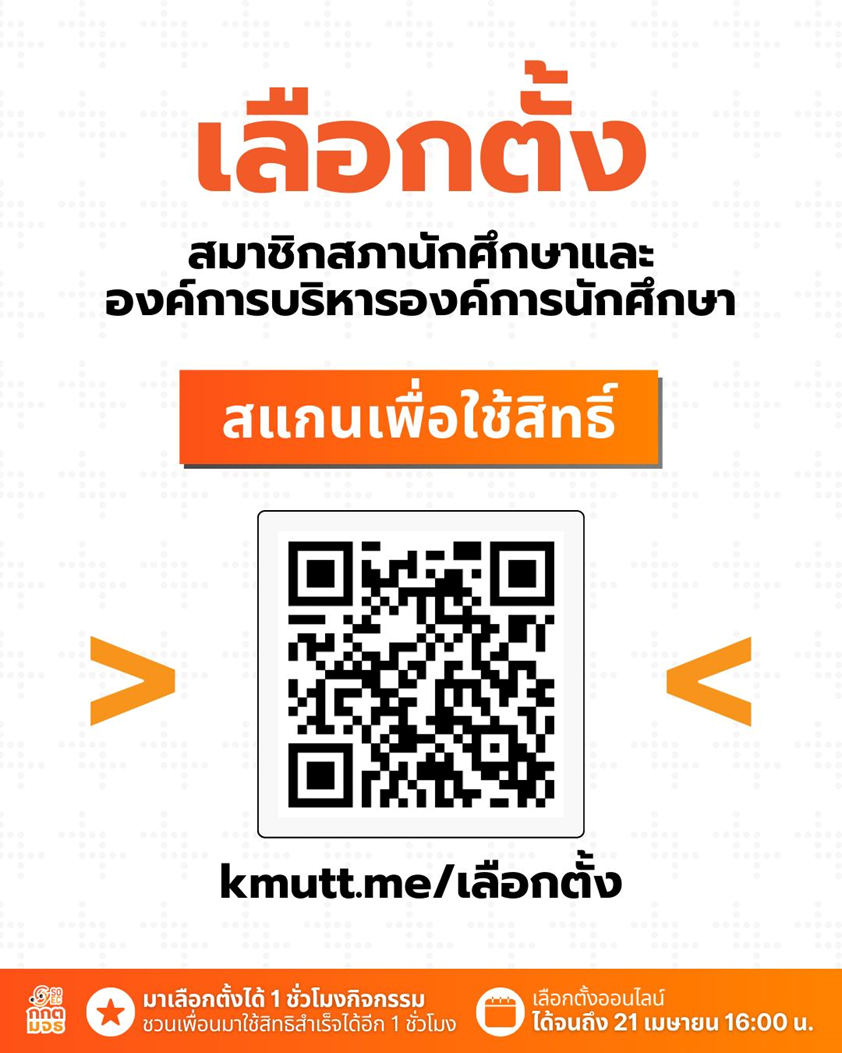
Faculty of Industrial Education and Technology Student Club
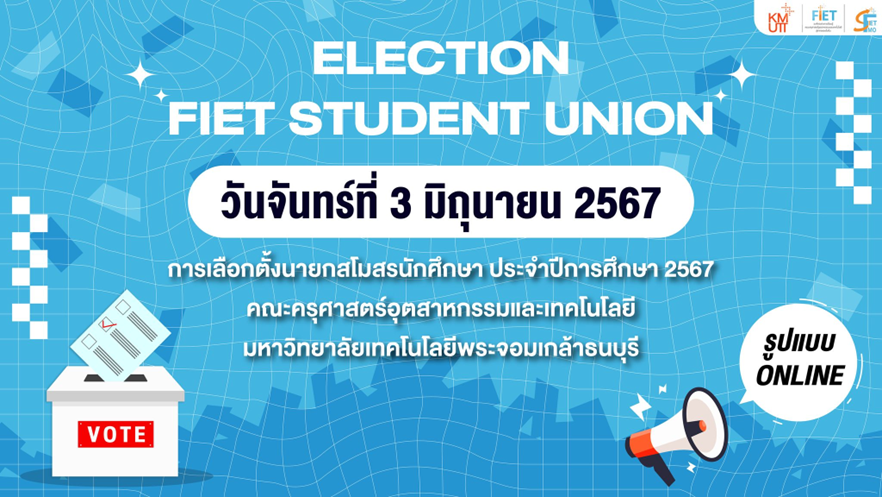


Faculty of Engineering Student Club


Faculty of Science Student Club






Office of the President of the Alumni Association





Alumni Association Board





3. Identify and engage with local stakeholders
Executive Participation, 1964 (o35)
In co-improvement, development and promotion of moral and transparency agencies.
King Mongkut’s University of Technology Thonburi (KMUTT supports corporate management with transparency can be verified according to the guidelines for driving government organization management under the framework of creating a good governance system in Administration The current rector announces the university administration policy with honesty, transparency, and morality, ethics and professionalism on February 4, 2019 by adhering to the “Code of Conduct Organization (Code of Conduct)” which has been promulgated since 2011 and is used as a standard of ethical conduct of KMUTT community until the present year.
joint improvement Develop and promote the unit on morality and transparency of the President for the year 2022.
1) The President announces the policy of honesty in work through meetings to exchange ideas, get acknowledgment problems, community or policy announcements through various public relations media to personnel of KMUTT.
In 2022, the university organized a seminar project on KMUTT Strategic Plan No. 13 (B.E. 2022 – 2526) 1st time (Kick off) on January 21, 2022 in online format via Microsoft Teams and together at AD907 Meeting Room, 9th Floor, Office of the President to remove the KMUTT development plan 2017 – 2036 or KMUTT Roadmap 2036 is a framework for the development of KMUTT in the medium term of 5 years, including brainstorming opinions from All departments and related parties amounted to more than 200 people, chaired by Assoc. open meeting as well as giving the university administration policy (Policy document Asst. Prof. Prasert Kanthamanon Senior Vice President for Administration Contribute to the development guidelines that are important for the preparation of the KMUTT strategic plan, which is considered Direction and operational guidelines according to the vision (Vision), including linking the development of departments in the university to be consistent with the potential of KMUTT and the direction of national development That’s right in the era of change. Fast for a new normal society (New Normal and future normal era (Next Normal).
The issue of management with transparency and integrity continues to be implemented continuously.


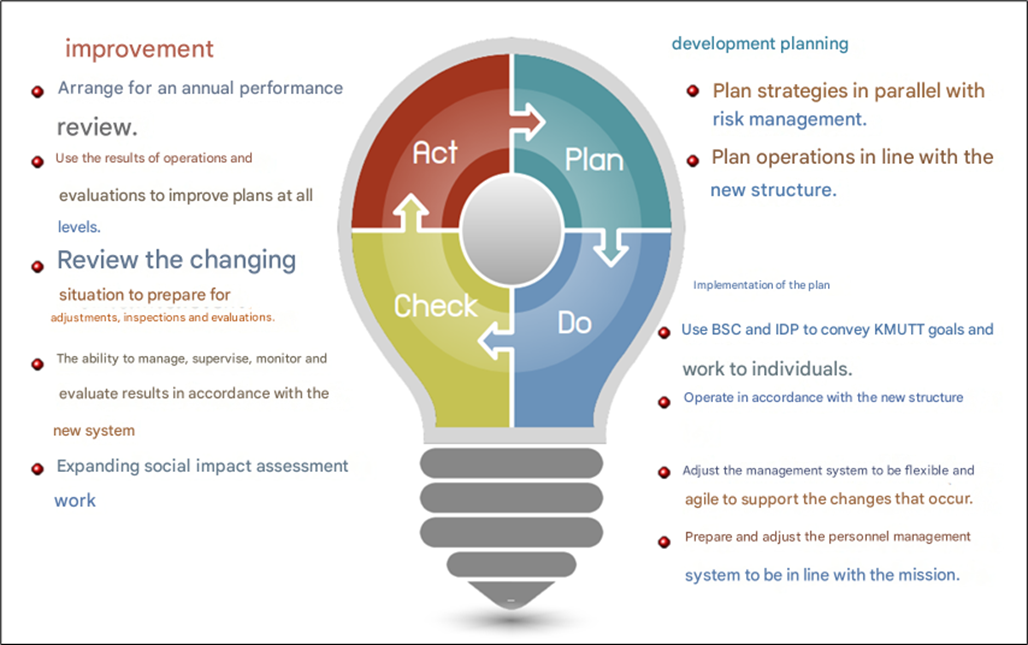
2) Principles for working with professional ethics (Code of Conduct) brought to awaken the personnel in the new teacher orientation and meeting with the president’s community.




KMUTT organized an activity “Creating understanding Compliance with measures and guidelines for using KMUTT’s assets.”
King Mongkut’s University of Technology Thonburi The ITA ad hoc committee organized activities “Create understanding Compliance with the measures and guidelines for using KMUTT’s assets” on Thursday, November 10, 2022, from 9:00 a.m. – 12:00 p.m. at the Prapa Meeting Room. Prajak Suphaniti, 9th Floor (AD 907), President’s Office Building and through electronic media (Zoom Meeting) with Asst. Prof. Sumet Angkasirikul, Vice President for Human Resources Reported on the objectives of the activity, Assoc. Prof. Dr. Suwit Saetia gave the opening speech and Asst. Prof. Dr. Prasert Khanthamanon, Senior Vice President for Administration Explain knowledge of compliance with the measures and guidelines for using KMUTT’s assets. The program was conducted by Ms. Chanthana Phuttharaporn, Director of the Administrative Office. (Director and Secretary ITA Ad Hoc Committee) Lecture topics include
3) Policy of the President and the Management Team To drive the administration of the university with integrity honestly verifiable through tools to improve and develop routine tasks to be effective (Daily Management).
from the declaration of good faith in the administration of the university with honesty Honesty of the President and management team At the start of his term in 2021, the President has Continue to announce policies to create participation. and help solve communication problems for personnel Insiders know about the administration of the university and gain an understanding of the administration with morality.
and transparency. continually called SIT&SIP at each meeting which circulates to meet each department The Rector will mention Guidelines, policies for university administration that are transparent, verifiable, want to develop and create workers who create value to society to operate with a process procedure that responds to customer service at all levels. participation through various activities of the university. In 2021, the rector has emphasized on the Drive university management with quality, transparency, and integrity through the words “Speed and Communication” by giving the policy to the Senior Vice President for Administration drive improvement and development Streamline routine tasks through a tool called Daily Management.
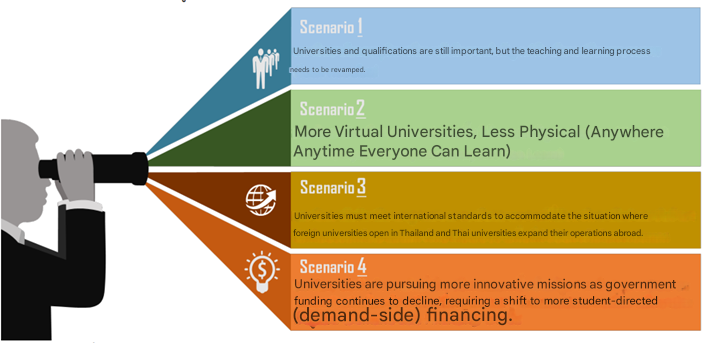


Work plan to improve daily work (Daily Management :DM) of the Office of the President (OTP)

The action plan to improve and develop the routine work of both KMUTT has been planned for 3 years (B.E. 2021-2023).
The President and administrators of KMUTT communicate to the community about handling corruption complaints to the community.
The policy “Drive improvement and development of routine tasks with the Daily Management tool” was announced. through the meeting of the Executive Coordinating Committee which is a meeting of the Dean, Director of the Office / Institute of University since February 2021, with the goal of allowing internal personnel to focus on working every day quality university processes There is an accurate working procedure. transparent, verifiable have consideration Risks arising from corruption or misconduct in the performance of duties and emphasize the participation of the community and public to help create a corporate culture in the future.
4) Summarize the results of the mechanism that drives the creation of an organizational culture in the practice of Honesty to the personnel of KMUTT through the 6+1 Flagships Track 2 network meeting for the fiscal year 2021.



On July 25, 2022, the 6+1 Flagships Track 2 Project Committee together with the Human Resources Management Office (HRB) and the Human Resources Development Office (HRB) organized a brainstorming seminar on the 6+1 Flagships Track 2 project. 35 on the topic “Understanding roles of HR for a better version of KMUTT” (for executives) to convey and create understanding of KMUTT Strategic Plan No. 13 (2022-2026) including understanding of policies on Human resources As well as creating an understanding of roles and responsibilities in human resource management and development at the Crystal Ballroom, Holiday Inn Bangkok Silom, and broadcast live via ZOOM.
5) When there is a problem or a case of fraud the university has open and verifiable complaint channels; and There are measures for handling complaints.



The President and administrators of KMUTT communicate to the community about handling corruption complaints to the community.
6) The President handed over the lawyers to the line to educate about the law and code of conduct.
Improving and developing daily work with Daily Management tools to improve the performance of KMUTT personnel according to the ethics and transparency guidelines (ITA)



Assoc. Prof. Kittisak Ploipanichcharoen, Advisor to the President on Quality Assurance, was honored to be a speaker to exchange knowledge with the Office of Student Registration in learning and creating understanding in the principles of developing and improving daily management work for personnel of the agency on March 12, 2024 at the UX 702 meeting room, KMUTT Bangmod, to create concepts and methods of working with effective and efficient processes to meet the needs of customers at all levels according to the PDCA approach from the beginning of the role and duty of the agency, different roles of policy and operational levels, planning work processes between supervisors and operators, writing work flow diagrams, explaining terminology for understanding and correct use. The work process that the Office of the Registration has brought as a pilot process in DM implementation is the student registration management process. In addition, there is a health and hygiene service group that continuously learns, bringing work processes related to on-site patient services to improve the work process according to the PDCA principles of Daily Management, which during August 2023 to the present, has presented work to the advisor and listened to advice continuously 12 times. Currently, the learning in the Plan phase has been completed and the DO phase has been initiated. Use the learning to develop and improve daily work from cases that occur during actual work. The processes of the health service and hygiene groups selected to implement DM as a pilot project include the disease screening and treatment service processes.
KMUTT Organizes Knowledge Seminar
on Integrity and Transparency Assessment (ITA) for Students


On May 27, 2025, the KMUTT ITA Ad-Hoc Coordination Team organized a knowledge seminar on the Integrity and Transparency Assessment (ITA) for public sector agencies. The seminar, titled “What is ITA? How does it concern us? Why do we need to cooperate?” was held online via Zoom Meeting for over 140 personnel from the Presidential Office. Participants also completed the ITA assessment form from the National Anti-Corruption Commission (NACC) during the session. The activity shared their knowledge on the importance of ITA and how it relates to both personnel and the university. Towards the end of the session, Staff of Office of the President were invited to participate in the Internal Integrity and Transparency Assessment (IIT). This event marks a crucial starting point in raising awareness, emphasizing the importance of, and encouraging greater participation from KMUTT personnel in the ITA assessment. Furthermore, the feedback received by the university from its personnel will serve as valuable input for continuous improvement and development of the university’s operational systems.

With the Office of Research, Innovation and Partners organizing a research ethics workshop according to the university announcement on the Research Ethics Policy (Research Integrity) (Issue 2) 2024, No. 6/2024 on Plagiarism and Peer Review Ethics by Assoc. Prof. Dr. Sakkamon Thephasadin Na Ayutthaya, Department of Food Engineering, Faculty of Engineering, King Mongkut’s University of Technology Thonburi on Monday, September 23, 2024 from 10:00 a.m. to 12:00 p.m., online lecture via the ZOOM program (480 people)

Human Research Ethics Training 3/2024 The Office of Research Ethics and Governance, Office of Research, Innovation and Partnership is scheduled to organize a training on “Human Research Ethics 3/2024” September 18, 2024, 9:00 a.m. – 4:30 p.m. Online lecture via ZOOM program

External Stakeholder Perception Survey (EIT) for the year 2025 King Mongkut’s University of Technology Thonburi would like to announce the channels for responding to the External Integrity and Transparency Assessment (EIT) for the year 2025 and would like to invite external stakeholders/service recipients, including alumni, current students, juristic persons, private companies or government agencies, external individuals, those who contact or receive services from the university, to participate in the survey of opinions and suggestions for improving the quality of the university’s operations.
KMUTT received an assessment of ethics and transparency in the operations of government agencies for fiscal year 2025 with a score of 94.41.
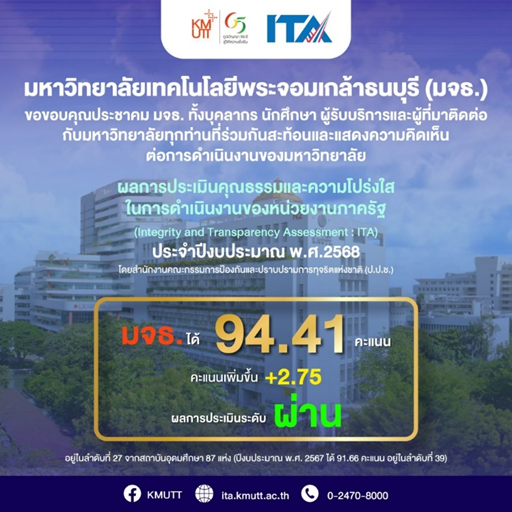
Announcement of King Mongkut’s University of Technology Thonburi
University Management with Integrity and Transparency
The university supports organizational management with transparency and auditability in accordance with the guidelines for driving government organization management under the framework of creating a good governance system in the administration of the President. Administer the university with honesty, transparency, morality, ethics and professionalism on February 4, 2019 by adhering to the Code of Conduct “which has been promulgated since 2011 and used as a standard of ethical conduct of The KMUTT Community.
In terms of enhancing the organization’s culture, KMUTT personnel have the attitude, values, and honest work. All KMUTT personnel will be disseminated and cultivated. Concepts and practices according to the principles of the Code of Conduct, which stipulates 10 codes of conduct for personnel as follows:
1) Conduct oneself within the framework of morality, ethics and organizational code of conduct
2) Be fair and respect the rights of actions and opinions of others
3) Adhere to the teaching and research ethics
4) Maintain academic freedom with responsibility
5) Manage with responsibility in duty
6) Protect and preserve university resources
7) Promote a corporate culture of compliance
8) Manage information, confidentiality, personal data and disclosable information with caution
9) Avoid conflicts of interest and obligations
10) Promote and develop working in a safe, safe and correct manner according to
occupational health principles
As well as the community of KMUTT must comply with the Code of Conduct for all 10 organizations. The university has imposed penalties for committing unethical acts that are serious disciplinary violations to have disciplinary actions in accordance with KMUTT regulations. And imposes penalties that are not disciplinary offenses to proceed in 3 ways: 1) Admonishing 2) Ordering them to proceed properly within the specified time 3) Parole
The university has defined unethical acts that are considered offenses. There are five serious disciplines as follows:
1. Wrongful use of other people’s works or academic works as one’s own
2. Sexual harassment or sexual relations with non-couple students or colleagues
3. Demanding or accepting bribes, property or any other benefits from students or service recipients or those who may benefit from the performance of their duties, including the use of their position and reputation of the agency for exploitation
4. Disclosure of the confidentiality of a student, client, or colleague who has received from their duties or from their trust by causing damage to students colleague or service recipients or seeking benefits from disclosing confidential information
5. Teaching or training students to act that they know is illegal or seriously violates the good morals of the people
Establish internal measures to promote transparency and prevent corruption. Therefore, in order to comply with the Integrity and Transparency guidelines, there are 7 key measures as follows:
1. Measures for disseminating information to the public
2. Measures for stakeholder participation
3. easures to promote transparency in procurement
4. Measures for handling corruption complaints
5. Measures to prevent bribery
6. Measures to prevent conflicts of interest
7. Measures to monitor the use of discretion in the
Announcement of King Mongkut’s University of Technology Thonburi
Measures for stakeholder participation
The University supports organizational management with transparency, auditability, in accordance with the guidelines for driving government organization management under the framework of creating a good governance system in administration, therefore, measures are set. Involve the stakeholders as follows:
Objectives
1. To enable the operation according to the mission of the university with efficiency, effectiveness, transparency and accountability in accordance with relevant rules and guidelines, participation in the operation to achieve
2. To provide opportunities for stakeholders Participate in recognizing diversity in effective performance improvement ideas and approaches.
Measures
1. Announcement of the policy to promote morality and transparency in the administration of the university to disseminate information of the university and other agencies to the public on the KMUTT website
2. Encourage people and stakeholders to take part in the operations of the attachments of the university
3. Announcement of an opportunity for people and stakeholders to participate in the operation of internal agencies to use as a guideline for the implementation of the university missions
4. Assign service agencies to have channels for listening to opinions, suggestions as well as expectations of service recipients and stakeholders on the development of the agency’s operations through various channels such as Feedback box, telephone (Call Center), website mail, electronic forms including self-promotion and opinion
5. Create an understanding for personnel to be aware of their duty to listen to the needs, expectations, satisfactions and dissatisfactions of the service recipients and stakeholders through various channels in order to provide information for improving operations.
6. The agency shall report on the results / activities / projects that allow people and stakeholders to participate in the operation to the university at least every fiscal year.
The model allows people or stakeholders to participate in the operation of KMUTT
| No. | Mission/Task | Target/Stakeholders | Form of Participation (Way/Step) | Undertaker |
| 1 | Graduate Production Course Preparation Teaching Management | Entrepreneur Representative / Graduate User Represen- tative/ Private Sector/ Alumni Organizations that have cooperation both domestically and internationally | Attend a meeting to give opinions and suggestions/ Opinion poll | Faculties/ Education Development Office |
| 2 | Graduate Production Student Orientation | Alumni/ Parent | Attend a meeting to give opinions and suggestions | Faculties |
| 3 | Research/ Academic | Users take advantage of the research and use the documents as references. | Performance Appraisal/ Opinion poll | Faculty/ Institute/ |
| 4 | Academic Service | Organization/ Agency/ Employer Work on academic services and partner agencies that work together | Attend a meeting to give information and opinions/ Put the results to good use | Personnel/ Academic service contractors |
| 5 | Academic service to society and community | Population/ Nearby Communities/ Teacher-Student Network | Participate in creative activities/ Give opinions/ Join, learn and take advantage | All relevant departments |
| 6 | University Service | External Experts/ Alumni | Being a qualified committee/ Attend a meeting to give opinions and suggestions | All relevant departments |
| 7 | Promotion of volunteer activities | Personnel/ Population/ Nearby Communities/ Teacher-Student Network | Participate in volunteer activities/ Give opinions/ Join, learn and take advantage | All relevant departments |
Executive Summary
Anti-Corruption Action Plan (2019-2022) prepared with a purpose to create a strong culture Create a culture of honesty within the university for sustainability with the concept and The principle complies with Code of Conduct which is a standard of ethics relied on in higher education institutions and the university announced for the internal community of the university, including staff, students All university stakeholders. Use it as a guideline and carry on the corporate culture according to the principles of good governance. The university will implement an action plan. to promote and support the movement National Strategy on Anti-Corruption, Phase 3 for the organization to be successful in defense and suppress corruption and cultivate a reputation for honesty as well as not accepting Corruption in all forms for the benefit of the people of the country The university has set guidelines for Operate 3 strategies, consisting of Strategy 1 Build and promote “honest person” by enhancing awareness among students and personnel have a public mind including behaving in accordance with moral and ethical standards through The process of social convergence in systematic prevention and suppression of corruption to create a culture anti corruption for people in KMUTT Have consciousness in performing duties with honesty and with integrity verifiable as well as create incentives to change behavior by focusing on the common good Strategy 2 Build a reputation for honesty , There are good service practices. and in accordance with good governance Emphasis is placed on developing mechanisms for effective prevention and suppression of corruption. There must be a system of control and inspection of the performance of duties with good governance. There is a channel for receiving complaints Corruption cases that are more accessible To make work more efficient and reduce the chances of corruption. Strategy 3 Build a reputation for honesty Have morals and ethics in living and working together aims to promote participation from all sectors in the prevention and suppression of corruption and Participate in preventing corruption behavior and misconduct of personnel. for the driving mechanism of the Anti-Corruption Action Plan (2019-2022) is driven by the quality cycle. with an emphasis on participation Understanding, Tracking process and evaluation by allowing all relevant departments to share responsibility.
4. Related information on our university as a body having an existence of participatory bodies to recognize and engage local stakeholders, including local residents, local government, local private, local civil society representatives.
King Mongkut’s University of Technology Thonburi Efforts are made to manage the university’s existing assets for maximum benefit. To provide additional income to the main income of the university. Establish an agency “Benefit and Property Utilization Unit” It is an organization that supports itself. Carry out property management work for the university. Both in terms of earning income and maintaining the benefits of the university. Coordinate with outsiders to carry out activities that promote income for the university.

External Stakeholder Perception Survey (EIT) for the year 2024 King Mongkut’s University of Technology Thonburi would like to announce the channels for responding to the External Integrity and Transparency Assessment (EIT) for the year 2024 and would like to invite external stakeholders/service recipients, including alumni, current students, juristic persons, private companies or government agencies, external individuals, those who contact or receive services from the university, to participate in the survey of opinions and suggestions for improving the quality of the university’s operations.

| Policy of Participating Stakeholder |

Announcement
King Mongkut’s University of Technology Thonburi (KMUTT)
Subject: Measures to Enable Stakeholder Participation
King Mongkut’s University of Technology Thonburi (KMUTT) supports the administration of the university with transparency in accordance with the principles of good governance. The university is committed to creating a transparent administrative system. Therefore, KMUTT has established measures to enable stakeholders to participate and express opinions as follows:
Objectives
-
To ensure that KMUTT operations are effective, efficient, transparent, and compliant with relevant rules, regulations, and guidelines.
-
To provide opportunities for stakeholders to participate in monitoring and offering suggestions regarding the university’s operations, allowing for diverse perspectives that contribute to improving work processes and enhancing operational efficiency.
Measures
-
Announce policies that promote participation and transparency in KMUTT’s administration by publishing information and news through KMUTT’s website and other communication channels.
-
Establish formats and opportunities for the public/stakeholders to participate and express opinions regarding KMUTT’s operations in accordance with designated procedures.
-
Provide opportunities for the public/stakeholders to participate in KMUTT operations. KMUTT shall arrange appropriate channels to receive opinions, suggestions, complaints, or inquiries. These may be submitted at any time through channels such as suggestion boxes, call centers, websites, online systems, or other communication methods as specified by the university.
-
Assign responsible units to review and consider opinions, suggestions, and complaints received from the public/stakeholders. The responsible units must analyze, summarize, and propose improvements or developments to enhance KMUTT’s work procedures and efficiency.
-
Encourage participation in reporting problems/activities/projects through channels made available for the public/stakeholders to express opinions regarding KMUTT operations for further improvement. This process shall be conducted without any discrimination.
5. Related information on our university as a body Publish the university’s principles and commitments on organized crime, corruption & bribery
Assessing the integrity and transparency in the operation of government agencies
(Integrity & Transparency Assessment: ITA)Fiscal Year 2025
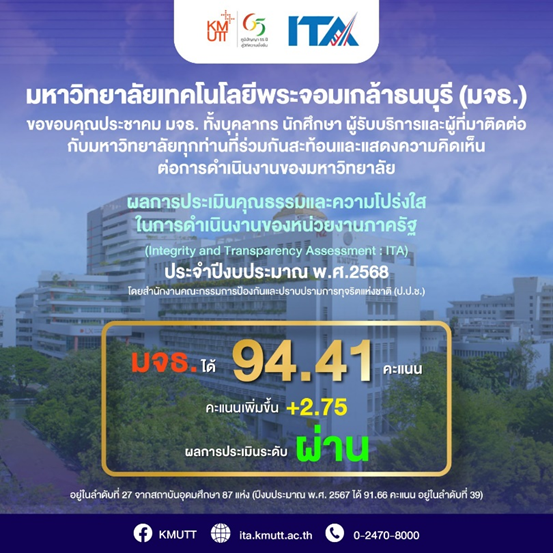
Assessment score 94.41 points Assessment result level A
6. Related information on our university having a policy on supporting academic freedom (freedom to choose areas of research and to speak and teach publicly about the area of their research).
King Mongkut’s University of Technology Thonburi has issued a policy on grade level education to facilitate the promotion of various forms of education and to encourage students to have the opportunity to work towards learning outcomes and experiences through the teaching and research that takes place.
Outcome-Based Education Module (OBEM)
The Regulations of King Mongkut’s University of Technology Thonburi on Undergraduate Studies B.E. 2557 (2014)
7. Publish financial data
Budget goals of King Mongkut’s University of Technology Thonburi
(1) Income situation
from the financial and budget pressures of the country Changes in national budget allocation policy As a result, the income of the university’s national budget has a tendency to decline continuously, for example, the personnel budget is expected to adjust the salary for the promotion of university employees by 2 percent, the monthly remuneration for academic positions 1 times, the operating budget that is the cost of materials education of students of all educational levels The land rental that the university has to contribute is 40 percent of the income, including the investment budget, especially the new contingent construction. There is a policy of not allocating the budget. Or if allocated, must find income to contribute at least 40 percent of the construction cost. The decrease in the budget has resulted in the university having to use the income to contribute to the reduction as well. Most of which are operating budgets from routine tasks (Function based)2
In addition, the merger of the Office of the Higher Education Commission (OHEC) with the Ministry of Science and Technology to become the Ministry of Higher Education, Science, Research and Innovation (TSU) from the reform of higher education, science, research and innovation. create a science promotion fund Research and Innovation (IRD). Program Management Units (PMU) was born as a capital granting and management agency. Currently, there are 7 units, consisting of Area Development Capital Management and Management Unit (TAMC), Administrative Unit. and managing capital for enhancing the country’s competitiveness and funding for the development of higher education institutions Research and Innovation Creation (OCC), National Innovation Agency (NIA), Office of Agricultural Research Development, Public Organization (OIE), Health Systems Research Institute (NIA), National Research Office (NRCT) have The budget allocation from the Fund ATF is the Fundamental Fund (FF) and the Strategic Fund (SF).
As for higher education, the Higher Education Act B.E. 2562 states Article 45 preparation of requests and budget allocation for higher education Section 45 (1) personnel budget 45 (2) operating budget and other expenditure budget which is a regular budget, including investment budget (Function based). Section 45 (1) (2) shall be submitted directly to the Bureau of Budget, and Section 45 (3) investment budget and subsidy budget for use in the development of institutional excellence. higher education and specialized advanced manpower production according to the needs of the country. Part of it is reforming the financial system for higher education. by budgeting, focusing on demand-side financing and establishing a fund for higher education development
(1.1) Government revenue
Due to the current situation, the revenue from the government budget has decreased continuously. In particular, the budget for operations from regular missions (Function based) or budgets that come from Section 45 (2), as well as from the outbreak of the coronavirus disease 2019 (COVID-19), forced the government to reduce the budget to help. economy, society and people, but the university also has the opportunity to increase income from Article 45 (3), which is the allocation of budgets for various projects, the development of excellence in higher education institutions and the production of specialized advanced manpower according to the needs of the country. For example, the Reinventing University project, a new breed of graduates project. or projects that are the needs of other ministries, including projects from government loan programs to help the economy and society from the COVID-19 situation, such as the Ministry of Higher Education, Science, Research and Innovation (TSU) projects to employ people Affected by COVID-19, the University to Sub-District Project Build Roots for the Country (U2T), which is a budget that supports universities to work in different areas, provinces by hiring new graduates, students and the general public. However, these projects are competitive bidding, where universities must determine their potential and develop their strengths and offer projects that are more in line with national needs.
(1.2) Tuition income
Currently, the main income from tuition fees comes from students in the age group of courses offered at both the bachelor’s level. and graduate studies (master’s and doctoral degrees are professional and research) due to population restructuring, resulting in a decrease in the student population. The number of KMUTT students also decreased, especially at the graduate level.
However, the university also has the opportunity to provide educational services to people of all ages according to the Thai higher education philosophy and the new higher education system. Build learners to be moral, ethical, and competent that are necessary and to support society and technology that suddenly changes (Disruption) both in the present and in the future. production and development of manpower with various sectors such as the government, the private sector, and the civil society and the community closely Combined with the impact of the Covid situation and the government’s budget has been reduced continuously. As a result, the university has to use the knowledge and expertise that it has to increase income from the original degree to Non Degree, which the university has a Platform KMUTT4Life or educational management. Micro-Credentials (MC), such as organizing short courses for those who want Reskill/Upskill/New Skill for working age people or people who want to change jobs/professions and the existing curriculum must be revised up to date and must be more in line with the needs of graduate users. Or it is a course in cooperation with a company or an enterprise to develop knowledge and skills of the employees of that company.
(1.3) Income from research and academic services
Most of the previous sources of income from research and academic services came from other government agencies that KMUTT is often referred to as external funding sources because they are projects that are not supported by the Bureau of Budget. For research projects from the state that have been allocated from the Bureau of Budget, KMUTT, are called research projects Wor.1. When the budget mechanism of the Ministry of Education is adjusted, the research budget will be moved to the Science Promotion Fund. Research and Innovation (IRD). Therefore, universities must propose research projects for support, such as large projects, targeted projects. It will be a scholarship in the Strategic Fund (SF) or research project. Specifically innovative, project proposals are submitted to the Program Management Units (PMUs). It is important that universities need competent research teams. Highly experienced researchers and good research management system and academic services to show that the university can deliver research results in a timely manner For the development of strength in research and innovation It will be a scholarship called Fundamental Fund (FF), which the university must assess the potential. From the adjustment of the budget allocation model for the ARC, it is an opportunity to increase revenue. In addition, due to the outbreak of COVID-19, universities have the opportunity to earn income from research and academic services that respond to the COVID-19 situation, but income from research and academic services from the industrial sector will be reduced. However, in the future, research work and academic services with the industrial sector are another channel that can be increased if the economic conditions improve. But the university must adjust its research management system and academic services with new strategies in networking and alliances. For the fiscal year 2022 – 2026, the goal of earning money from research and academic services is quite challenging. By the end of KMUTT Strategic Plan No. 13, academic personnel must be able to earn income from research and academic services. Intellectual Property Management and investment in innovation business with an average of the past 3 years (Rolling average) worth not less than 2.00 million baht per head
(1.4) Revenue from Asset Management
At present, the income from the management and management of university assets, which are both tangible and intangible assets (Tangible & Intangible Asset), is not very large. KX area NBF area Student dormitory or even equipment research tools (There must be a plan to use various tools and equipment for maximum benefit), including the use of intellectual property. (Intellectual Property) to be used for commercial benefits, such as technology transfer, startup, spin-off, licensing, and transfer of rights, which the university must have a management plan for the further use of intellectual property. Another important part of bringing the accumulated money to invest. Currently, the university uses the money to buy bonds. including depositing in commercial banks will receive a certain amount of return
(1.5) Income from fundraising (Fundraising)
In the future, the university should have an opportunity to increase its funding income. (Fundraising) Currently, this portion of the income is derived from donations. And mostly come from alumni (Alumni), such as scholarships, for other parts, there are few, such as Bangkok Bank Limited, King Mongkut’s University of Technology Thonburi branch or from organizing the anniversary of the founding of the university Currently, the university has a unit responsible for funding. which should be planned for further fundraising
(2) Expenses The university has estimated expenses as follows:
(2.1) Personnel expenses
The university has a policy to manage human resources for productivity. During this period, there will be no new hires, especially support staff. This is partly due to the improvement of the system and the use of technology to work more. There is an upgrade and adjustment of personnel profiles and reform of personnel management. If a new person needs to be added, only the personnel who support the new job will be added.
(2.2) Operating expenses
When the situation returned to normal Or is it a new normal way (New Normal), it is expected that some expenses may increase close to the original. Or some items may be less, such as the cost of office materials (paper), the cost of meals in various meetings and is expected in the future to be organized into an online or hybrid system more. Various, whether it is a contract for cleaning services Security service fee And other contract wages. When the university has reviewed and adjusted various contracts for contract work, this part of the cost will be reduced from the original. for utilities and utilities Since the university has a policy of energy saving and conservation that has been in operation for many years. and is in the process of installing a solar power generation system which if completed Universities will be able to save and reduce electricity costs from fiscal year 2023 onwards.
(2.3) Investment expenses (cost of equipment, cost of construction)
As the overall budget of the country has decreased. But the government has a policy to allocate a budget that is about 20 percent of the total annual budget for investment expenditures. As a result, during the year 2023 onwards, the university has received a budget for equipment and construction improvements for approximately 623 million baht per year. The university therefore proposes guidelines for various departments within the university. Consider investment expenditure requests that primarily meet the strategic plan’s policies and goals. or as necessary equipment for the replacement of the original to obtain an allocation from the state budget first causing the request for the investment budget bud get with income will be reduced Requests for operating income will only consider items that are important and urgently needed, such as those related to the safety of life and property. Digital related items
Revenue during the KMUTT Strategic Plan No. 13 (B.E. 2022 – 2026)
Estimated Revenue During the KMUTT Strategic Plan No. 13 (2022 – 2026), the university expects to receive income from various funding sources, including budget from the government, tuition fees, research and academic services from external funding sources, and income. Others, such as income from intellectual property management Rental income of various areas and income from fundraising, etc. (details as shown in Figure 1) accounted for the proportion of budget from the state. towards income from education to income from research, academic services and other income at the end of KMUTT No. 13 strategic plan, equal to 1: 1.08 : 1.55, respectively. (Increase only the part of the money used to promote the salary) Tuition income will be increased from the new educational management model for people of all ages (Non age group) with the goal of increasing the proportion of income from education. Provide education (from Non Degree group) towards total educational management income. (excluding state income) 20 percent and will increase income from research and academic services The goal is to have income from research and academic services. Intellectual Property Management and investment in innovation business, average of the past 3 years (Rolling average) is worth not less than 2.0 million baht per head. (Academic personnel) as well as other income such as income from rental space increased by an average of 30 percent per year and income from fundraising increased by about 7% per year.
Revenues 2020 – 2021 (results) and years 2022 – 2026 (plans)

Revenues 2020 – 2021 (results) and years 2022 – 2026 (plans)
Expenses during the KMUTT Strategic Plan No. 13 (BE 2022 – 2026)
For the projection of expenses classified by necessary expenses and expenditures for various activities during the fiscal year 2022 – 2026, the university expects total expenses to be 3,880.00, 4,220.00, 4,460.00, 4,650.00 and 4,820.00 million baht, respectively. Classified by expenditure category as follows (details shown in Figure 2)
-
- Personnel expenses are equal to 1,480.00, 1,530.00, 1,560.00, 1,580.00 and 1,620.00 million baht, respectively.
-
- Operating expenses are equal to 1,793.00, 2,020.00, 2,210.00, 2,400.00 and 2,520.00 million baht, respectively.
-
- Utility expenses equal to 105.00, 120.00, 120.00, 130.00 and 130.00 million baht, respectively.
-
- Investment expenses (Equipment and construction costs) were 502.00, 550.00, 570.00, 540.00 and 550.00 million baht, respectively.

Revenues 2020 – 2021 (results) and years 2022 – 2026 (plans
Executive Summary
Anti-Corruption Action Plan (2019-2022) prepared with a purpose to create a strong culture Create a culture of honesty within the university for sustainability with the concept and The principle complies with Code of Conduct which is a standard of ethics relied on in higher. education institutions and the university announced for the internal community of the university, including staff, students All university stakeholders.
Use it as a guideline and carry on the corporate culture according to the principles of good governance. The university will implement an action plan. to promote and support the movement National Strategy on Anti-Corruption, Phase 3 for the organization to be successful in defense and suppress corruption and cultivate a reputation for honesty as well as not accepting Corruption in all forms for the benefit of the people of the country. The university has set guidelines for Operate 3 strategies, consisting of
Strategy 1 Build and promote “honest person” by enhancing awareness among students and personnel have a public mind including behaving in accordance with moral and ethical standards through The process of social convergence in systematic prevention and suppression of corruption to create a culture anti corruption for people. in KMUTT Have consciousness in performing duties with honesty and with integrity verifiable as well as create incentives to change behavior by focusing on the common good
Strategy 2 Build a reputation for honesty, There are good service practices. and in accordance with good governance Emphasis is placed on developing mechanisms for effective prevention and suppression of corruption. There must be a system of control and inspection of the performance of duties with good governance. There is a channel for receiving complaints Corruption cases that are more accessible To make work more efficient and reduce the chances of corruption. Strategy 3 Build a reputation for honesty Have morals and ethics in living and working together aims to promote participation from all sectors in the prevention and suppression of corruption and Participate in preventing corruption behavior and misconduct of personnel. for the driving mechanism of the Anti-Corruption Action Plan (2019-2022) is driven by the quality cycle. with an emphasis on participation Understanding, Tracking process and evaluation by allowing all relevant departments to share responsibility.ycle. with an emphasis on participation Understanding, Tracking process and evaluation by allowing all relevant departments to share responsibility.
Anti-Corruption Action Plan (2019-2022) King Mongkut’s University of Technology Thonburi
Assessing the integrity and transparency in the operation of government agencies
(Integrity & Transparency Assessment: ITA)
Fiscal Year 2025
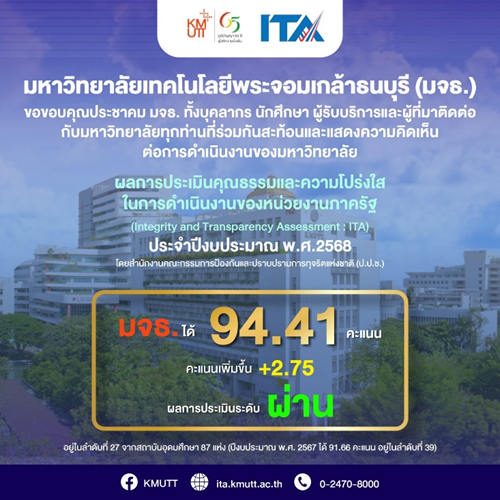
Assessment score 94.41 points Assessment result level A
History
Problems that arise in society concerning government agencies that operate without transparency There is no moral and ethical administration. including many corruptions and misconduct causing enormous impacts and damage to the country The Office of the National Anti-Corruption Commission (NACC) is aware of the problem and its impact. Therefore, the idea was to develop a tool to indicate the level of integrity and transparency in the operation of government agencies, and later developed a system for assessing the integrity and transparency in the operation of government agencies. The year 2013 Integrity & Transparency Assessment (ITA) is a tool that explores integrity and transparency. The performance of duties of government officials in accordance with the code of conduct, ethical administration. as well as paying or demanding bribes from government officials by surveying both in perception-based dimension, which is surveying the opinions of service recipients or stakeholders with government agencies (External Stakeholders) and officials within government agencies (Internal Stakeholders) and in the evidence dimension
Evidence-Based is a survey based on evidence of the operation of government agencies. The evaluation of the integrity and transparency in the operation of government agencies has the following objectives:
-
- To assess the level of integrity and transparency in the operation of government agencies.
- In order for government agencies to be aware of guidelines for improvement or development in matters of morality and transparency in their operations.
Assessing the integrity and transparency in the operation of government agencies has been defined as a positive complementary measure for the prevention and suppression of corruption. In the National Strategy on Prevention and Suppression of Corruption, Phase 2 (2013 – 2017), the NACC in the meeting no. 500 – 65/2013 on 29 August 2013 therefore has the resolution agreed in principle to adopt a system of integrity assessment and transparency in the operation of government agencies. Implemented in the years 2014 and 2015 – 2017 as a tool for evaluating the anti-corruption assessment and upgrading the integrity and Transparency in the operation of government agencies to be higher in 2014, the NACC conducted a pilot assessment of the integrity and transparency in the operation of government agencies. in the form of requesting cooperation from agencies to participate in the project, consisting of independent organizations, constitutional organizations, court organizations (offices only), Secretariat of the House of Representatives. Secretariat of the Senate Central government agencies at the ministry level and affiliated with the ministry Provincial government agencies, state enterprises, public organizations, provincial administrative organizations, municipalities, and special forms of local administrative organizations, totaling 259 agencies, which all government agencies cooperated well, and the assessment results showed that government agencies had an average score of 72.84. scores, which are considered to have a high level of integrity and transparency
Subsequently, on February 24, 2015, the Cabinet approved the government agencies to convert the guidelines and measures according to the National Strategy on Anti-Corruption Phase 2 (2013 – 2017) into practice. by specifying in the 4-year government action plan and annual government service plan There are the Office of the Public Sector Anti-Corruption Commission (Office of P.O.A.), the Office of the Public Sector Development Commission (OPC), the Office of the Civil Service Commission (OCC), and the Office of the Faculty. The National Economic and Social Development Board (NESDB) is the main agency in supporting the movement for government agencies to implement the National Strategy. In 2015, the NACC conducted a formal assessment of integrity and transparency in the operation of government agencies for the first time. And has expanded the scope of government agencies participating in the project throughout the country, including independent organizations, constitutional organizations, court organizations (only the office), the Secretariat of the House of Representatives. Secretariat of the Senate Central government agencies at the ministry level and affiliated with the ministry Provincial government agencies State enterprises public organizations Provincial Administrative Organizations City municipalities
Subdistrict, Subdistrict Administrative Organization and special forms of local government organizations, totaling 8,197 agencies, with agencies involved in the assessment, namely the Office of the Public Sector Anti-Corruption Commission (PACC) and the Department of Local Administrative Promotion. The results of the assessment of morality and transparency in the operation of government agencies have also been used as part of the evaluation of government performance of the Office of the Public Sector Development Commission (OPC). The project is in the process of final processing points.
Present, the government has recognized the importance of the integrity and transparency assessment system in the operation of government agencies. On January 5, 2016, the Cabinet has approved that all government agencies are involved in the assessment. Integrity and transparency in the operation of government agencies in the fiscal year 2016 – 2017 as proposed by the NCCC
Integrity and Transparency Assessment in the operations of government agencies (Integrity and Transparency Assessment) or ITA assessment for fiscal year 2022 is the 10th year of operation and the 5th year. that has been adjusted to an online assessment It is also the last year of Phase 1 (2018 – 2022) of the master plan under the national strategy. Anti-corruption and misconduct issues In driving the ITA assessment for fiscal year 2022, this is also a collaboration of 5 joint monitoring agencies, namely the NACC Office, NACC Office, Department of Local Administration. Office of the State Enterprise Policy Committee and the Office of the Permanent Secretary, Ministry of Higher Education, Science, Research and Innovation There are 8,303 government agencies nationwide. Participate in the assessment It is said to be Thailand’s largest public sector governance and management assessment to date. By raising the level of good governance to enable government agencies to operate with transparency. There are guidelines to prevent risks that may cause fraud. as well as being able to deter corruption that may occur. The ITA assessment is a positive assessment that covers all dimensions of an agency’s performance. From the management of the executives and the operations of the officers within the agency. as well as evaluating the “work system”, especially the transparent disclosure process of the procurement process. Including procedures and procedures for operating and providing services that are of a standard and fair and non-discriminatory. have good characteristics in accordance with the principles of good governance Including the assessment of “culture” in agencies that focus on fostering culture and honesty values. and prevention of operations that may cause conflicts of interest as well as assess the overall performance reflected by the perceptions of internal and external stakeholders. To promote the operation of integrity and transparency in accordance with the policy of the National Strategy. make personnel aware of the importance Together to create “work systems” and “services” with standards, transparency and fairness. as well as preparing to support the assessment of morality and transparency in the operation of King Mongkut’s University of Technology Thonburi
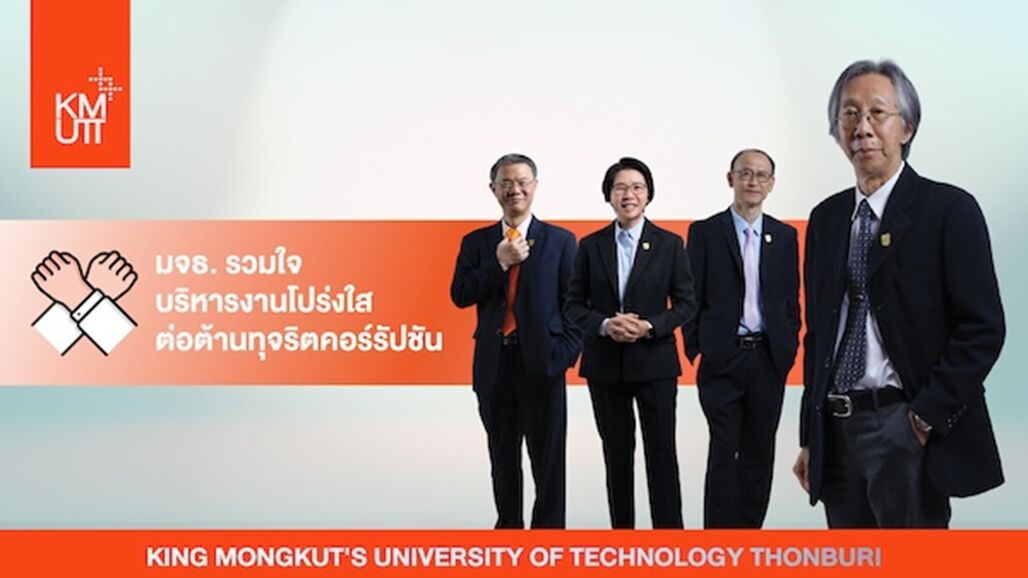
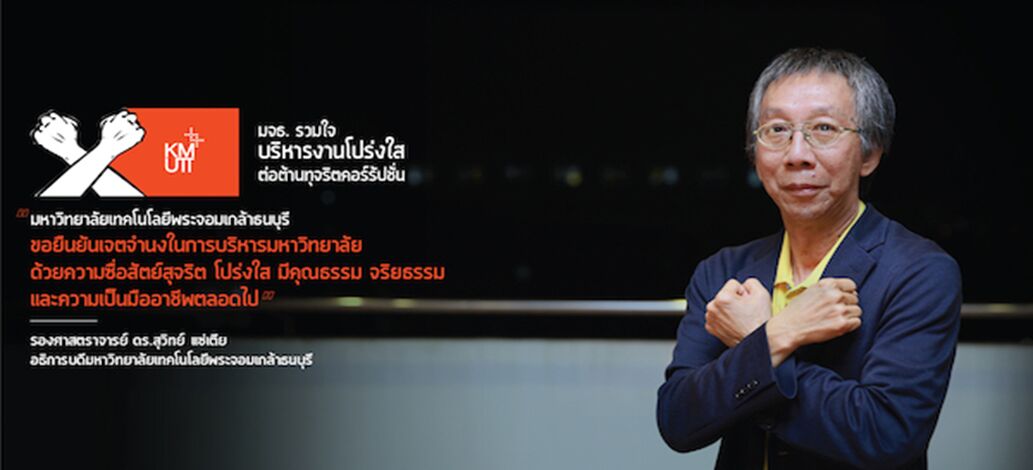
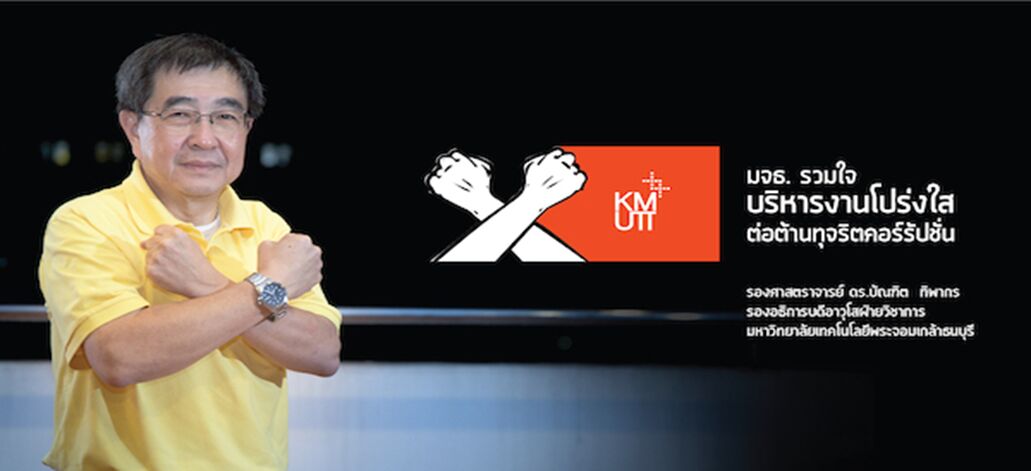
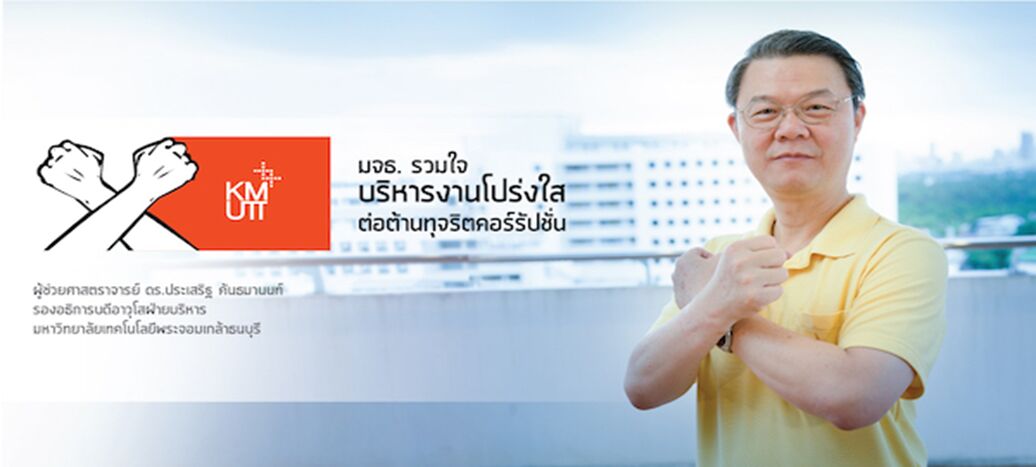
16.3 WORKING WITH GOVERNMENT
1. Related information on our university as a body on providing specific expert advice to local, regional or national government.
In 2025, there were 35 KMUTT personnel supporting the government’s work in driving Thailand’s policy and sustainability as details below has relations with regional NGOs and governments for SDG policy forwards development about SDGs strategic and create innovation for sustainable.
This were 35 KMUTT personnel supporting the government’s work in driving Thailand’s policy and sustainability as details below :
| No. | Name- Surname | Ministry / Organization | Title |
| 1 | KANYAWIM KIRTIKARA | Ministry of Science and Technology | Vice Minister Ministry of Science and Technology |
| Office of National Higher Education Science Research and Innovation Policy Council | Assistant Office of National Higher Education Science Research and Innovation Policy | ||
| 2 | KOSIN CHAMNONGTHAI | University of the Thai Chamber of Commerce | Dean, Faculty of Engineering, University of the Thai Chamber of Commerce |
| SCHITT LAOWATTANA | TOT PUBLIC COMPANY LIMITED | Director, TOT PUBLIC COMPANY LIMITED | |
| 3 | National Science and Technology Development Agency | Consultant for the development of hard disk drive program management, National Science and Technology Development Agency | |
| 4 | CHAOWALIT LIMMANEEVICHITR | Ministry of Digital Economy and Society | Secretary of the Digital Minister for Economy and Society |
| Ministry of Science and Technology | Secretary of Ministry Science and Technology | ||
| 5 | CHOTIKA VIRIYARATTANASAK | Nippon Suisan Kaisha Co., Ltd. | Researcher |
| 6 | NARONGRIT SOMBATSOMPOP | Ministry of Science and Technology | Advisor to the Minister of Science and Technology |
| 7 | TIRANEE ACHALAKUL | Ministry of Digital Economy and Society | Assistant to Ministry of Digital Economy and Society |
| Director of the Institute for the Promotion of Big Data Analysis and Management, Government Sector Ministry of Digital Economy, and Society | |||
| 8 | NONGYAO SRIPROMSUK | Knowledge Network Institute of Thailand | Researcher |
| 9 | BUNDIT THIPAKORN | Ministry of Education | Assistant to Ministry of Education |
| Office of the Higher Education Commission | Deputy Secretary General of the Higher Education Commission Office of the Higher Education Commission | ||
| Secretary General of the Higher Education Commission Office of the Higher Education Commission | |||
| 10 | BOONCHAROEN SIRINAOVAKUL | Secretary ‘s Office of Office of the Higher Education Commission | Assistant to Secretary’s Office of Office of the Higher Education Commission |
| 11 | PRASERT KANTHAMANON | Ministry of Education | Assistant to Ministry of Education |
| 12 | PONGPAN KAEWTATIP | Thailand Science Research and Innovation | Deputy Director of Industry Thailand Science Research and Innovation |
| 13 | PASIT LORTERAPONG | Ministry of Higher Education, Science, Research and Innovation | Science and technology consultant (Policy and Plan Analyst) |
| 14 | The Eastern Economic Corridor (EEC) | Project Management of the Infrastructure Office to assist and support, The Eastern Economic Corridor (EEC) | |
| 15 | PICHET DURONGKAVEROJ | Knowledge Network Institute of Thailand (KNIT) | Director of Knowledge Network Institute of Thailand (KNIT) |
| Knowledge Network Institute of Thailand (KNIT) | Acting Director of Knowledge Network 16Institute of Thailand (KNIT) | ||
| National Science Technology and Innovation Policy Office | Secretary General, National Science Technology and Innovation Policy Office | ||
| Secretary’s Office of Office of the Higher Education Commission | Board and project management Framework for Long Term Higher Education Development Plan, 2008-2022 | ||
| 16 | Jonathan Hoyin Chan | EATLAB Co., Ltd. | Specialist |
| 18 | PEERADON SAMASIRI | Government Big Data institute Digital Economy Promotion Agency | Experts in special high-level data. Government Big Data institute Digital Economy Promotion Agency |
| 19 | MONTRI SUPATTATHAM | Queen Collage | Development consultants, Internet, and computer technology education |
| 20 | MORAKOT TANTICHAROEN | National Science and Technology Development Agency | Advisor to the Director of the National Center for Genetic Engineering and Biotechnology National Science and Technology Development Agency |
| Assistant Director, National Center for Genetic Engineering and Biotechnology National Science and Technology Development Agency (NSTDA) | |||
| Director, National Center for Genetic Engineering and Biotechnology National Science and Technology Development Agency (NSTDA) | |||
| 21 | YOSSAPONG LAOONUAL | Rajamangala University of Technology Lanna | Professor Rajamangala University of Technology Lanna |
| Thailand Automotive Institute | Specialist and Representative of Electric Vehicle Association of Thailand Director | ||
| 22 | WANNA TEMSIRIPOJ | Secretary’s Office of Office of the Higher Education Commission | Assistant, Secretary’s Office of Office of the Higher Education Commission |
| 23 | WORAWARONG RAKREUNGDET | Academic of the Committee on Science, Information and Communication Technology National Legislative Assembly | Academic of the Committee on Science, Information and Communication Technology National Legislative Assembly |
| Kamnoetvidya Science Academy | Advisor of the School of Science Project Establishment | ||
| 24 | VITOON UTHAISANGSUK | National Science and Technology Development Agency | TAIST-Tokyo Tech Assistant Director TAIST-Tokyo Tech Project |
| 25 | WIWAT RUENGLERTPANYAKUL | Mahidol Wittayanusorn School | Director Mahidol Wittayanusorn School |
| 26 | VISA SAETIA | Secretary’s Office of Office of the Higher Education Commission | Secretary-General to Office of the Higher Education Commission |
| 27 | SAKARINDR BHUMIRATANA | National Science and Technology Development Agency | Advisor to Director National Science and Technology Development Agency |
| Director, Science and Technology Development Agency | |||
| 28 | SANSANALAK RACHDAWONG | PTT Chemical Public Company Limited | Science and Innovation Manager of Science and Innovation |
| Mitr Phol Sugar Corporation., Ltd. | Biochemical Value a creation Senior Manager, Research and Development Division Biochemical Value a creation | ||
| Mitr Phol Sugar Corporation., Ltd. | (Bio-based) Head of research and development of biotechnology | ||
| 29 | SOMCHART SOPONRONNARIT | Shinawatra University | President Shinawatra University |
| 30 | SURAPONT TOOMNARK | Mahidol Wittayanusorn School | Consultants Computer Science Mahidol Wittayanusorn School |
| 31 | SURAPAP RAYANAKORN | Bank of Thailand | Assistant Director of the Data Athletic |
| 32 | SUVIT SAETIA | National Center for Genetic Engineering and Biotechnology | Advisor of National Center for Genetic Engineering and Biotechnology |
| Advisor Energy and resource efficiency programs and programs supporting research and development EGAT – NSTDA. | |||
| Deputy Director National Center for Genetic Engineering and Biotechnology | |||
| 33 | APINYA KAMYA | Government Big data Institute | Specialist |
| 34 | ALUCK THIPAYARAT | Facultyof Engineering Burapha University | Government assistant |
| 35 | AUAPONG YAICHAROEN | Department of Electrical Engineering Silpakorn University | Advisor to the head of the Department of Electrical Engineering, Faculty of Engineering, Silpakorn University |
Global Partnerships
KMUTT has established the bonds of partnership with the universities and global networks aiming to forester collaboration which contribute to high quality international academic and research collaborations.
KMUTT has signed the academic agreement with almost 300 universities/institutes abroad. The activities under the agreement are such as collaborative research, lectures, symposiums, the exchange of information and materials, researchers as well as undergraduate and graduate students, etc.
International Engagement
International engagement has strongly enlarged during many last decades owing to rapid developments in scientific communication, economic, politic and education terms also influence international collaboration links among countries.
Memberships
As honored to be a member of International Associations, KMUTT has been significantly supported and promoted the university’s benchmark performance. Human resources and students are also bestowed an opportunity to enhance their sustainable potential. It brings about great reputation in an international level to KMUTT.
– AIMS: ASEAN International Mobility for Students
– APHERP: Asia Pacific Higher Education Research Partnership
– ASAIHL: The Association of South East Asian Institutions of Higher Learning
– ASEA-UNINET: Asian – European University Network
– AUAP: Association of Universities of Asia and the Pacific
– IAUP: International Association of University President
Partner Institutions
In education term, KMUTT as an institution of and , has signed the academic agreement with almost 130 universities/ institutes abroad with the objective of promoting cooperation in the fields of education and academic research. The activities under the agreement are such as collaborative research, lectures, symposiums, the exchange of information and materials, researchers as well as undergraduate and graduate students, etc.
The Courtesy Visit of H.E. Mr. Ovikuroma Orogun Djebah, Ambassador of the Federal Republic of Nigeria to Thailand.

The delegation was warmly welcomed by Assoc. Prof. Dr. Suvit Saetia, KMUTT President, together with Assoc. Prof. Dr. Chaowalit Limmaneevichitr (Vice President for Student Development), Assoc. Prof. Dr. Pornapit Darasawang (Vice President for Internationalisation), Asst. Prof. Dr. Parinya Sa Ngiamsunthorn (Associate Dean for Learning Initiatives and Internationalization of the Faculty of Science) and Ms. Sasima Juwasophi (Director of International Affairs Office).
The fruitful discussion focused on the current situation of Nigerian students at KMUTT and the possibilities to enhance future collaboration in science and technology, such as agriculture and food technology.
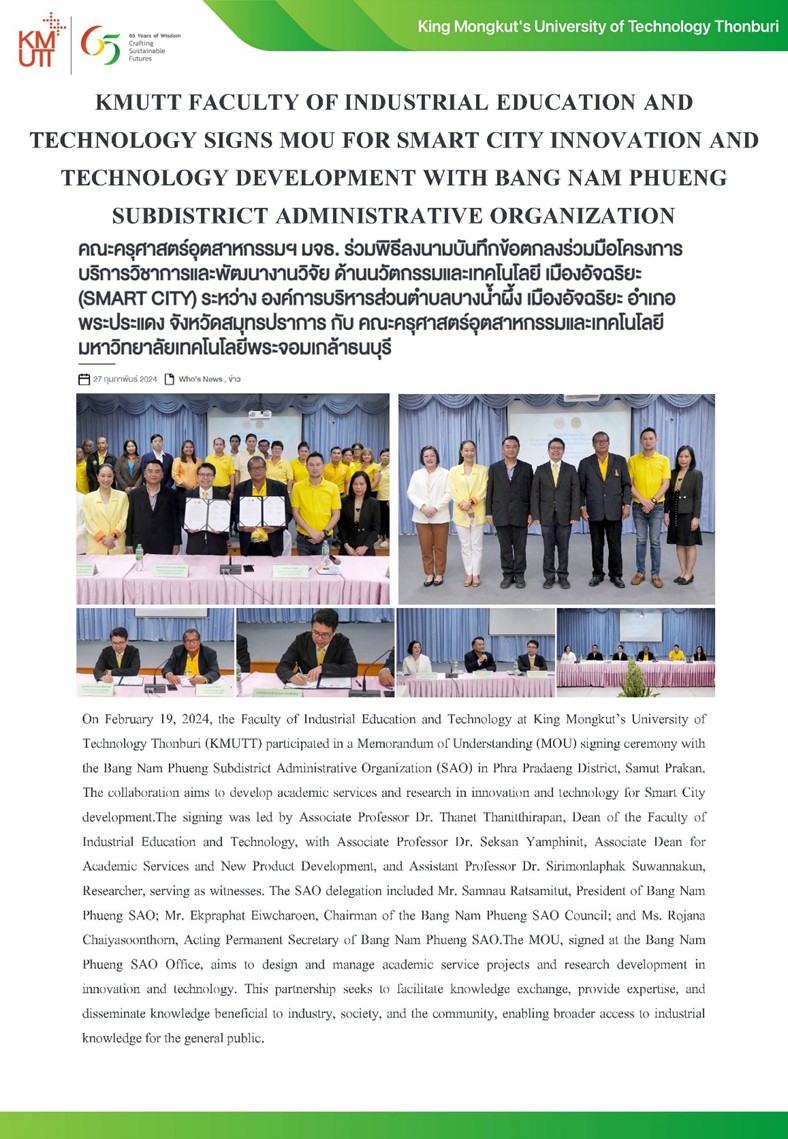
KMUTT FACULTY OF INDUSTRIAL EDUCATION AND TECHNOLOGY SIGNS MOU FOR SMART CITY INNOVATION AND TECHNOLOGY DEVELOPMENT WITH BANG NAM PHUENG SUBDISTRICT ADMINISTRATIVE ORGANIZATION
On February 19, 2024, the Faculty of Industrial Education and Technology at King Mongkut’s University of Technology Thonburi (KMUTT) participated in a Memorandum of Understanding (MOU) signing ceremony with the Bang Nam Phueng Subdistrict Administrative Organization (SAO) in Phra Pradaeng District, Samut Prakan.
The collaboration aims to develop academic services and research in innovation and technology for Smart City development.
The signing was led by Associate Professor Dr. Thanet Thanithiripan, Dean of the Faculty of Industrial Education and Technology, with Associate Professor Dr. Seksan Yampinint, Associate Dean for Academic Services and New Product Development, and Assistant Professor Dr. Sirinnamlaphuk Suwannakun, Researcher, serving as witnesses.
The SAO delegation included:
-
Mr. Samnau Ratsamrit, President of Bang Nam Phueng SAO
-
Mr. Ekkaphat Eiwharoen, Chairman of the Bang Nam Phueng SAO Council
-
Ms. Rojana Chaiyasornthorn, Acting Permanent Secretary of Bang Nam Phueng SAO
The MOU, signed at the Bang Nam Phueng SAO Office, aims to design and manage academic service projects and research development in innovation and technology. This partnership seeks to facilitate knowledge exchange, provide expertise, and disseminate knowledge beneficial to industry, society, and the community, enabling broader access to industrial knowledge for the general public.
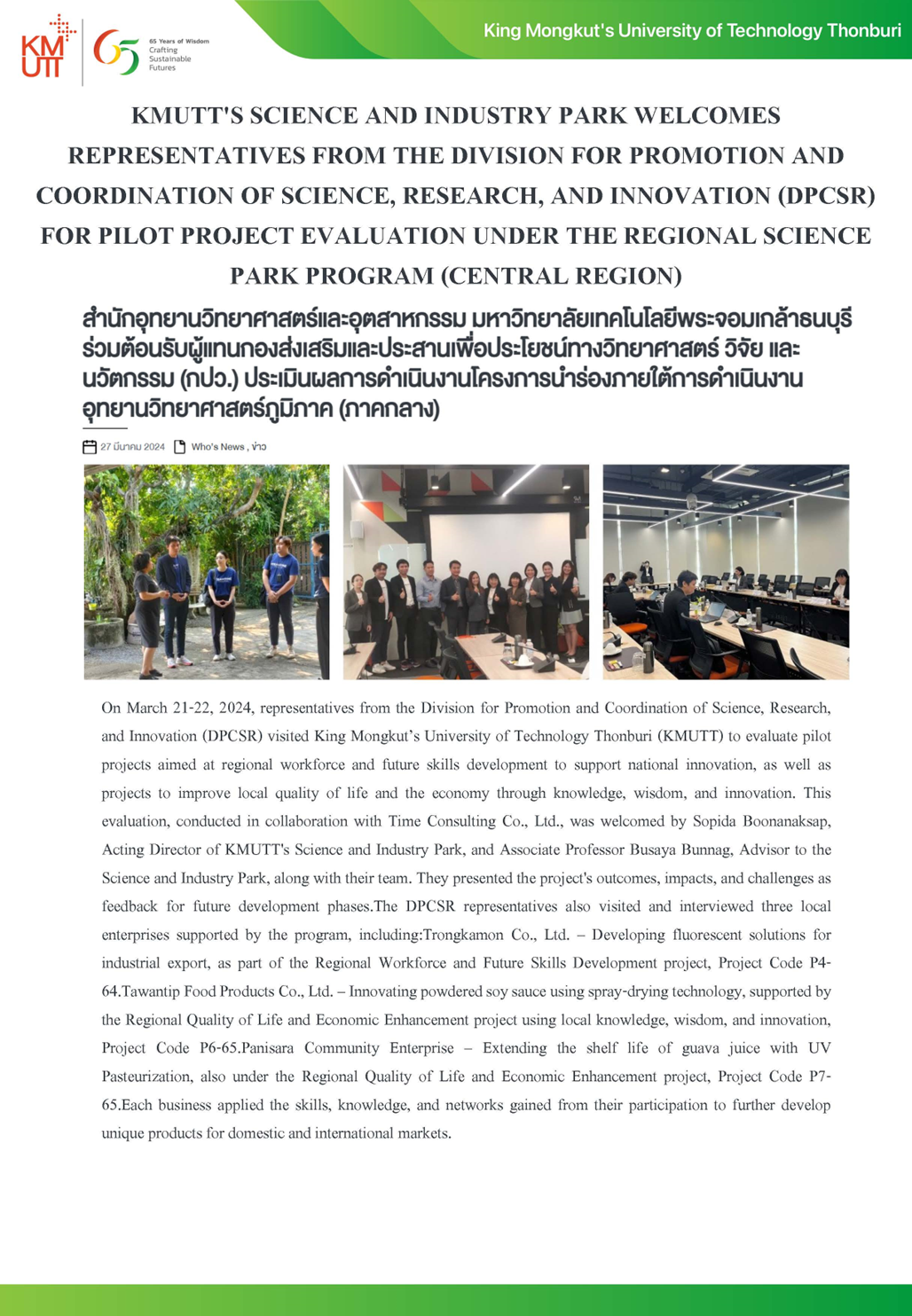
KMUTT’S SCIENCE AND INDUSTRY PARK WELCOMES REPRESENTATIVES FROM THE DIVISION FOR PROMOTION AND COORDINATION OF SCIENCE, RESEARCH, AND INNOVATION (DPCSR) FOR PILOT PROJECT EVALUATION UNDER THE REGIONAL SCIENCE PARK PROGRAM (CENTRAL REGION)
On March 21–22, 2024, representatives from the Division for Promotion and Coordination of Science, Research, and Innovation (DPCSR) visited King Mongkut’s University of Technology Thonburi (KMUTT) to evaluate pilot projects aimed at regional workforce and future skills development to support national innovation, as well as projects to improve local quality of life and the economy through knowledge, wisdom, and innovation.
This evaluation, conducted in collaboration with Time Consulting Co., Ltd., was welcomed by Sopida Boonanaksap, Acting Director of KMUTT’s Science and Industry Park, and Associate Professor Busaya Bunnag, Advisor to the Science and Industry Park, along with their team. They presented the project’s outcomes, impacts, and challenges as feedback for future development phases.
The DPCSR representatives also visited and interviewed three local enterprises supported by the program, including:
-
Trongkamon Co., Ltd. – Developing fluorescent solutions for industrial export, under the Regional Workforce and Future Skills Development project, Project Code P4-64.
-
Tawantip Food Products Co., Ltd. – Innovating powdered soy sauce using spray-drying technology, supported by the Regional Quality of Life and Economic Enhancement project using local knowledge, wisdom, and innovation, Project Code P6-65.
-
Panisara Community Enterprise – Extending the shelf life of guava juice with UV Pasteurization, also under the Regional Quality of Life and Economic Enhancement project, Project Code P7-65.
Each business applied the skills, knowledge, and networks gained from their participation to further develop unique products for domestic and international markets.

ACADEMIC AND RESEARCH COLLABORATION DISCUSSION ON “COMMUNITY/SOCIETAL RESILIENCE: ADAPTING TO THE EFFECTS OF GLOBAL WARMING”
On Monday, March 18, 2024, the Social Sciences and Humanities Division, in collaboration with the Environmental Social Sciences program, Faculty of Liberal Arts, at King Mongkut’s University of Technology Thonburi (KMUTT), hosted Prof. Ricardo García Mira from Universidade da Coruña (UDC), Spain, an expert in environmental psychology.
The meeting included discussions with:
-
Prof. Dr. Shabbir H. Gheewala from the Joint Graduate School of Energy and Environment (JGSEE) at KMUTT
-
Assistant Professor Dr. Sasithorn Suwannathep, Dean of the Faculty of Liberal Arts
-
Assoc. Prof. Richard Watson Todd, Associate Dean for Research, Faculty of Liberal Arts
-
Assistant Professor Dr. Pasanan Asawaraks, Assistant Dean for Research
-
Dr. Papamananchu Seeprasharth
-
Dr. Itthisak Chirapornvaree
-
Dr. Kesakanya Tatsuwan, faculty members of the Environmental Social Sciences program
The meeting aimed to explore academic and research collaborations under the theme “Community/Societal Resilience: Adapting to the Effects of Global Warming.” This initiative supports KMUTT’s Social and Environmental Innovation Research Unit, which aims to advance sustainable development in social and environmental sciences and strengthen academic efforts in environmental social sciences.
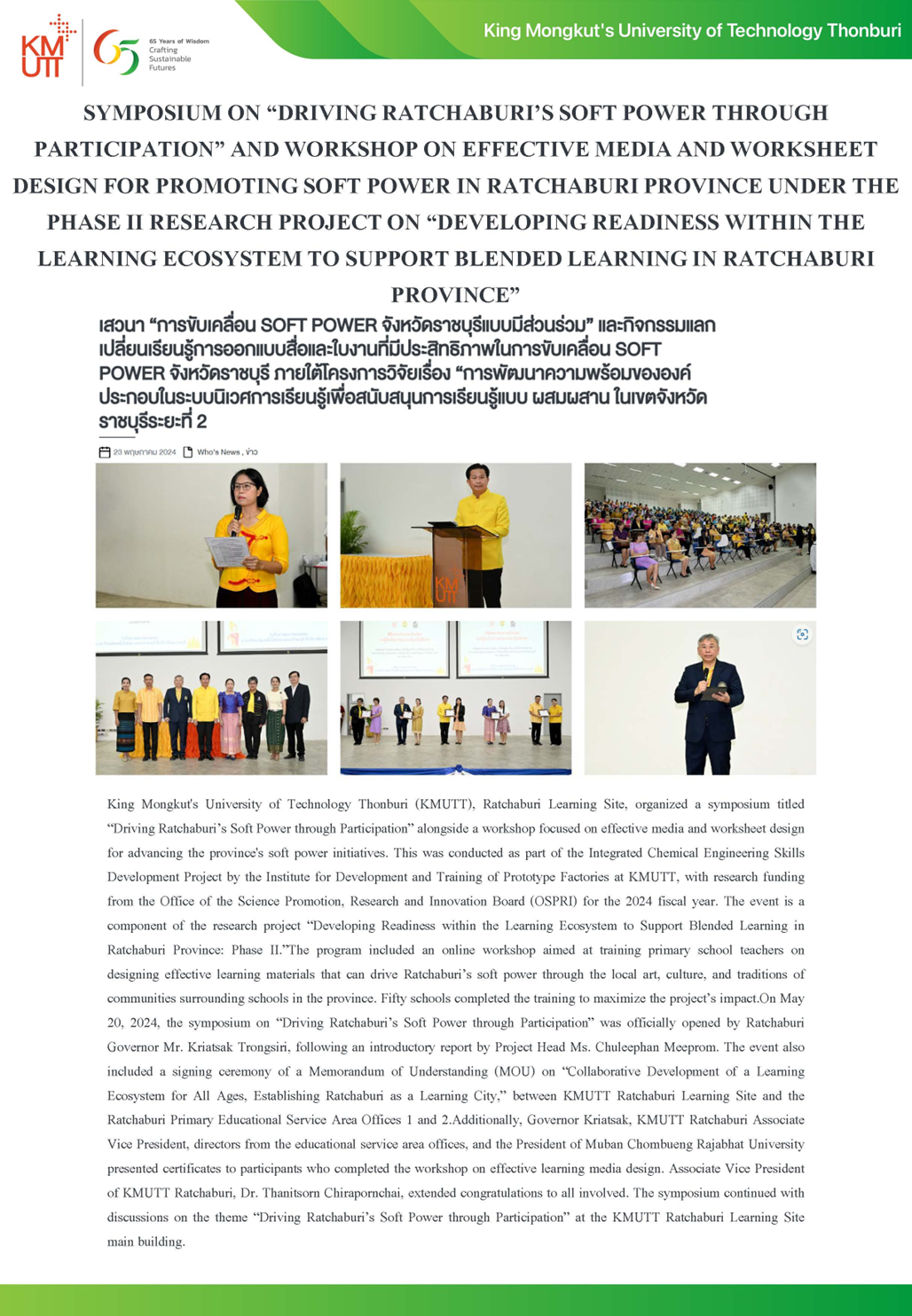
SYMPOSIUM ON “DRIVING RATCHABURI’S SOFT POWER THROUGH PARTICIPATION” AND WORKSHOP ON EFFECTIVE MEDIA AND WORKSHEET DESIGN FOR PROMOTING SOFT POWER IN RATCHABURI PROVINCE UNDER THE PHASE II RESEARCH PROJECT ON “DEVELOPING READINESS WITHIN THE LEARNING ECOSYSTEM TO SUPPORT BLENDED LEARNING IN RATCHABURI PROVINCE”
King Mongkut’s University of Technology Thonburi (KMUTT), Ratchaburi Learning Site, organized a symposium titled “Driving Ratchaburi’s Soft Power through Participation” alongside a workshop focused on effective media and worksheet design for advancing the province’s soft power initiatives. This was conducted as part of the Integrated Chemical Engineering Skills Development Project by the Institute for Development and Training of Prototype Factories at KMUTT, with research funding from the Office of the Science Promotion, Research and Innovation Board (OSPRI) for the 2024 fiscal year.
The event is a component of the research project “Developing Readiness within the Learning Ecosystem to Support Blended Learning in Ratchaburi Province: Phase II.” The program included an online workshop aimed at training primary school teachers on designing effective learning materials that can drive Ratchaburi’s soft power through the local art, culture, and traditions of communities surrounding schools in the province. Fifty schools completed the training to maximize the project’s impact.
On May 20, 2024, the symposium on “Driving Ratchaburi’s Soft Power through Participation” was officially opened by Ratchaburi Governor Mr. Kritasak Trongsiri, following an introductory report by Project Head Ms. Chuleepan Meeproom. The event also included a signing ceremony of a Memorandum of Understanding (MOU) on “Collaborative Development of a Learning Ecosystem for All Ages, Establishing Ratchaburi as a Learning City,” between KMUTT Ratchaburi Learning Site and the Ratchaburi Primary Educational Service Area Offices 1 and 2.
Additionally, Governor Kritasak, KMUTT Ratchaburi Associate Vice President, directors from the educational service area offices, and the President of Muban Chombueng Rajabhat University presented certificates to participants who completed the workshop on effective learning media design. Associate Vice President of KMUTT Ratchaburi, Dr. Thanitsorn Chirapronchchai, extended congratulations to all involved.
The symposium continued with discussions on the theme “Driving Ratchaburi’s Soft Power through Participation” at the KMUTT Ratchaburi Learning Site main building.
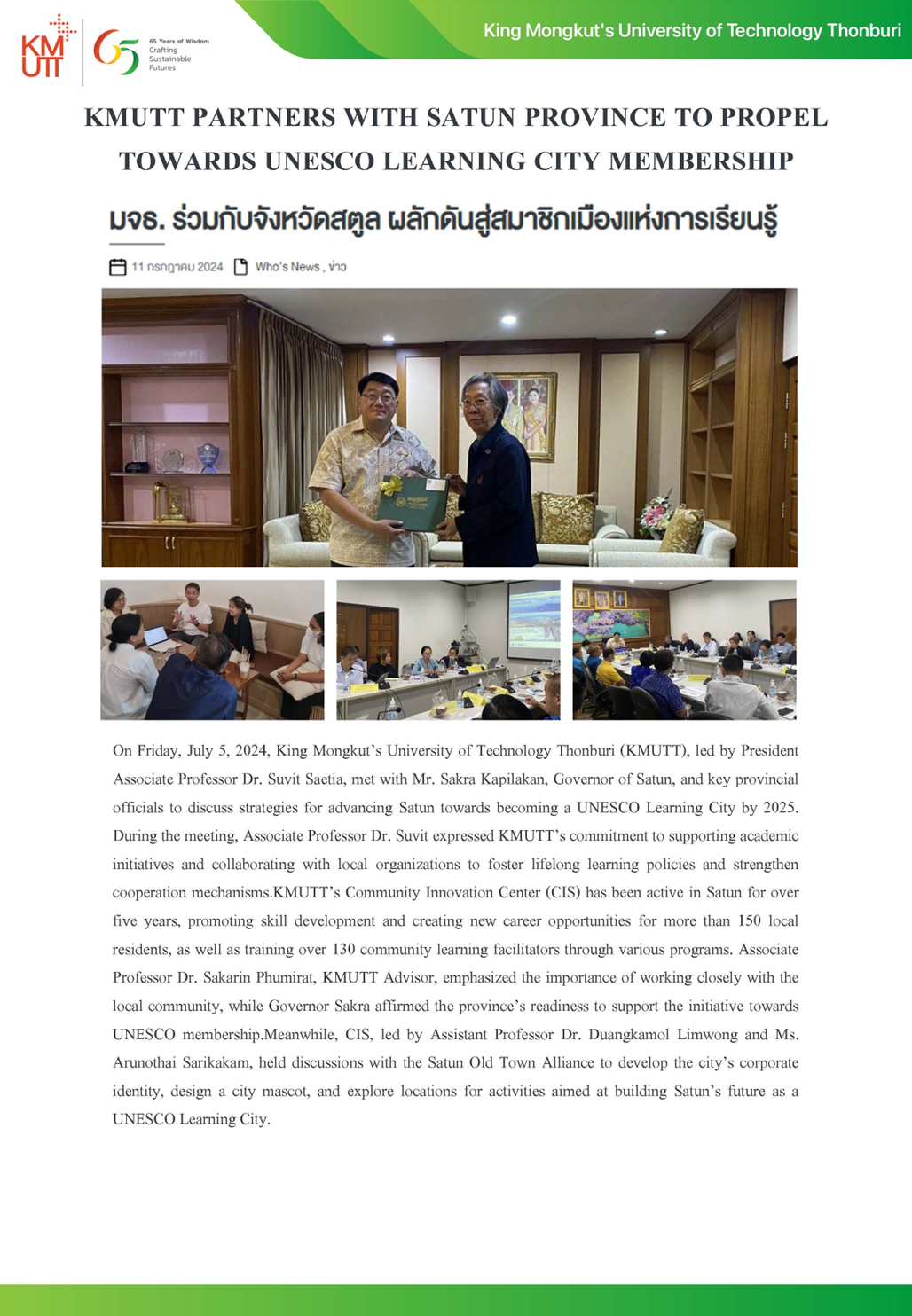
KMUTT PARTNERS WITH SATUN PROVINCE TO PROPEL TOWARDS UNESCO LEARNING CITY MEMBERSHIP
On Friday, July 5, 2024, King Mongkut’s University of Technology Thonburi (KMUTT), led by President Associate Professor Dr. Suvit Saetia, met with Mr. Sakra Kapilakan, Governor of Satun, and key provincial officials to discuss strategies for advancing Satun towards becoming a UNESCO Learning City by 2025.
During the meeting, Associate Professor Dr. Suvit expressed KMUTT’s commitment to supporting academic initiatives and collaborating with local organizations to foster lifelong learning policies and strengthen cooperation mechanisms. KMUTT’s Community Innovation Center (CIS) has been active in Satun for over five years, promoting skill development and creating new career opportunities for more than 150 local residents, as well as training over 130 community learning facilitators through various programs.
Associate Professor Dr. Sakarin Phumirat, KMUTT Advisor, emphasized the importance of working closely with the local community, while Governor Sakra affirmed the province’s readiness to support the initiative towards UNESCO membership.
Meanwhile, CIS, led by Assistant Professor Dr. Duangkamol Limwong and Ms. Arunothai Sarikakam, held discussions with the Satun Old Town Alliance to develop the city’s corporate identity, design a city mascot, and explore locations for activities aimed at building Satun’s future as a UNESCO Learning City.
2. Related information on our university as a body on providing outreach, general education, upskilling and capacity-building to policy and lawmakers on relevant topics including economics, law, technology, migration and displacement, and climate change
Policy and regulations and lawmakers outreach and education of KMUTT

Regulation of King Mongkut’s University of Technology Thonburi on University Council Meetings, 2002
Whereas it is deemed appropriate to issue the Regulation of King Mongkut’s University of Technology Thonburi on University Council Meetings,
By virtue of Section 18 (2) of the King Mongkut’s University of Technology Thonburi Act, and with the approval of the University Council of King Mongkut’s University of Technology Thonburi at its 49th meeting held on December 13, 2002,
The following regulation is hereby enacted:
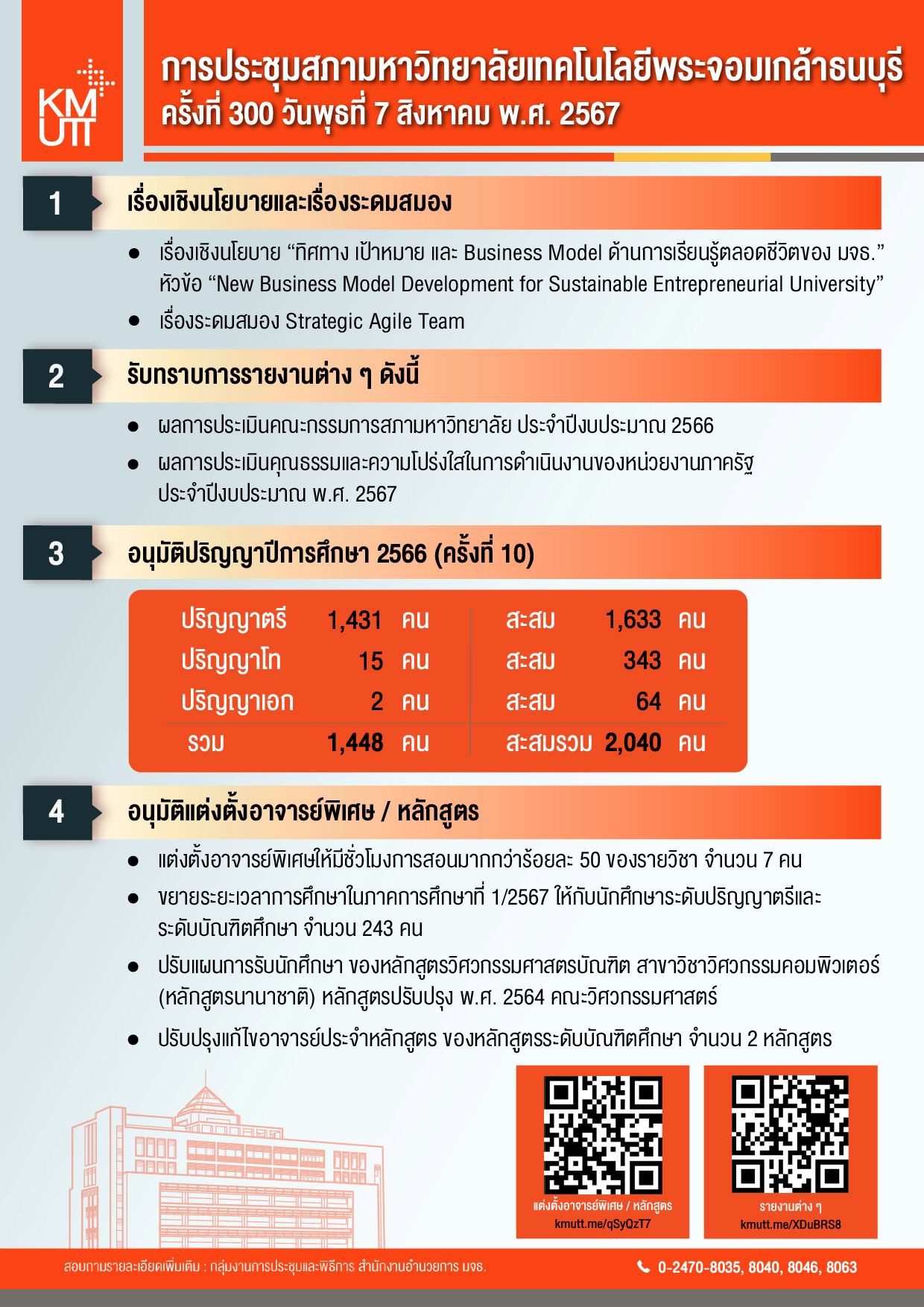
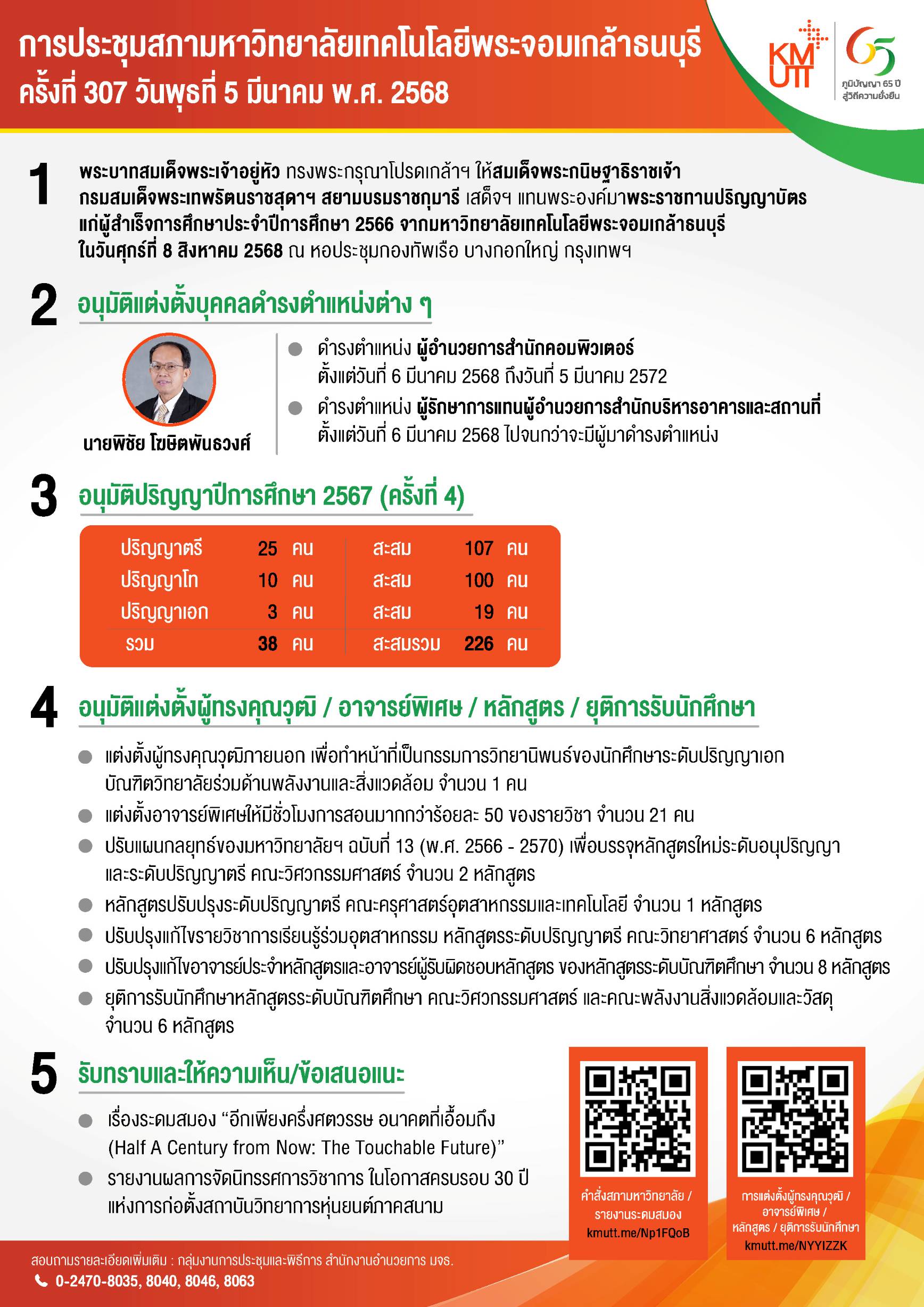
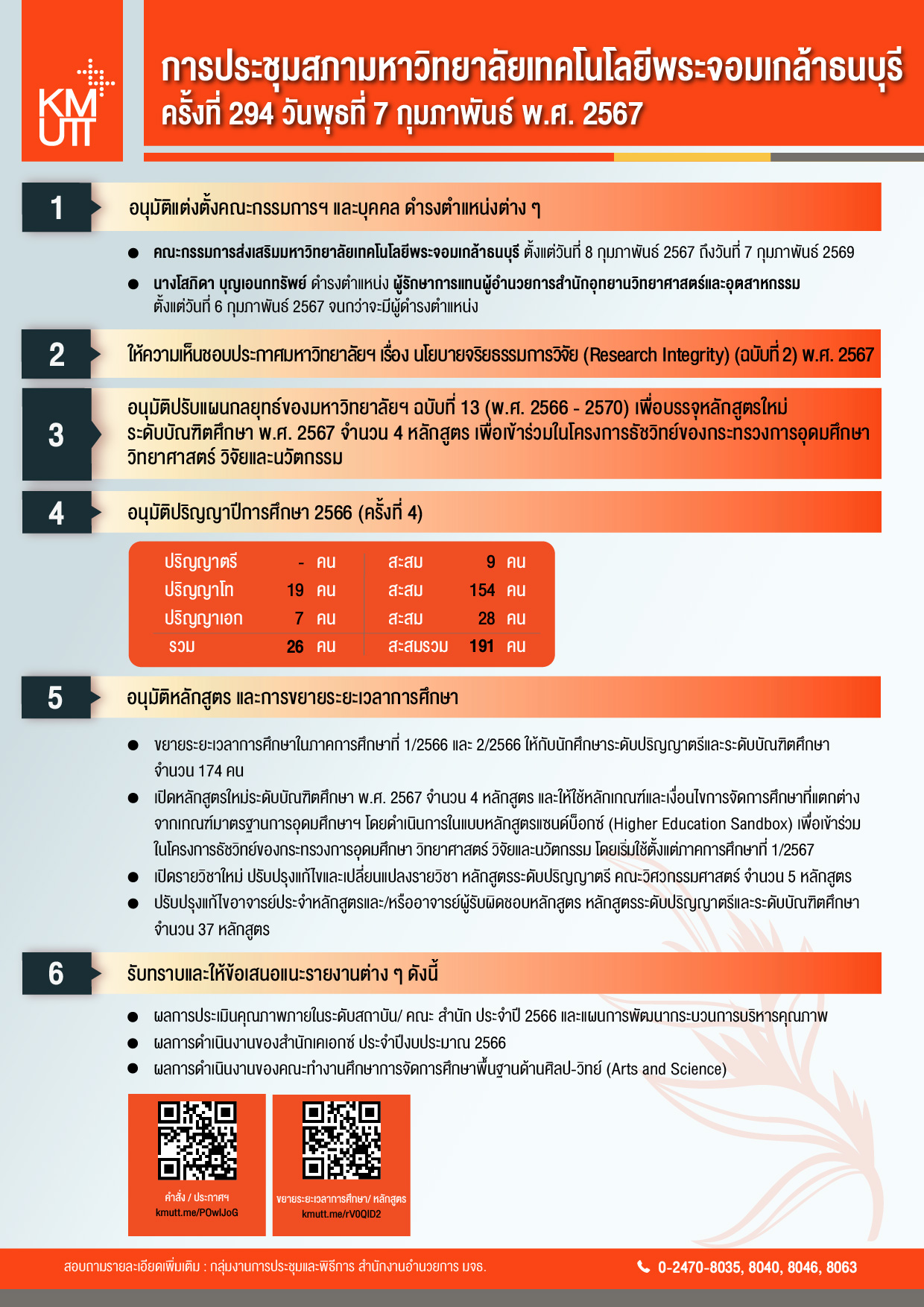
3. Related information on our university as a body on undertaking policy-focused research in collaboration with government departments
King Mongkut’s University of Technology Thonburi The company has participated in the study and conducted research with public and private agencies to research new technologies and inventions to drive the country’s development further.
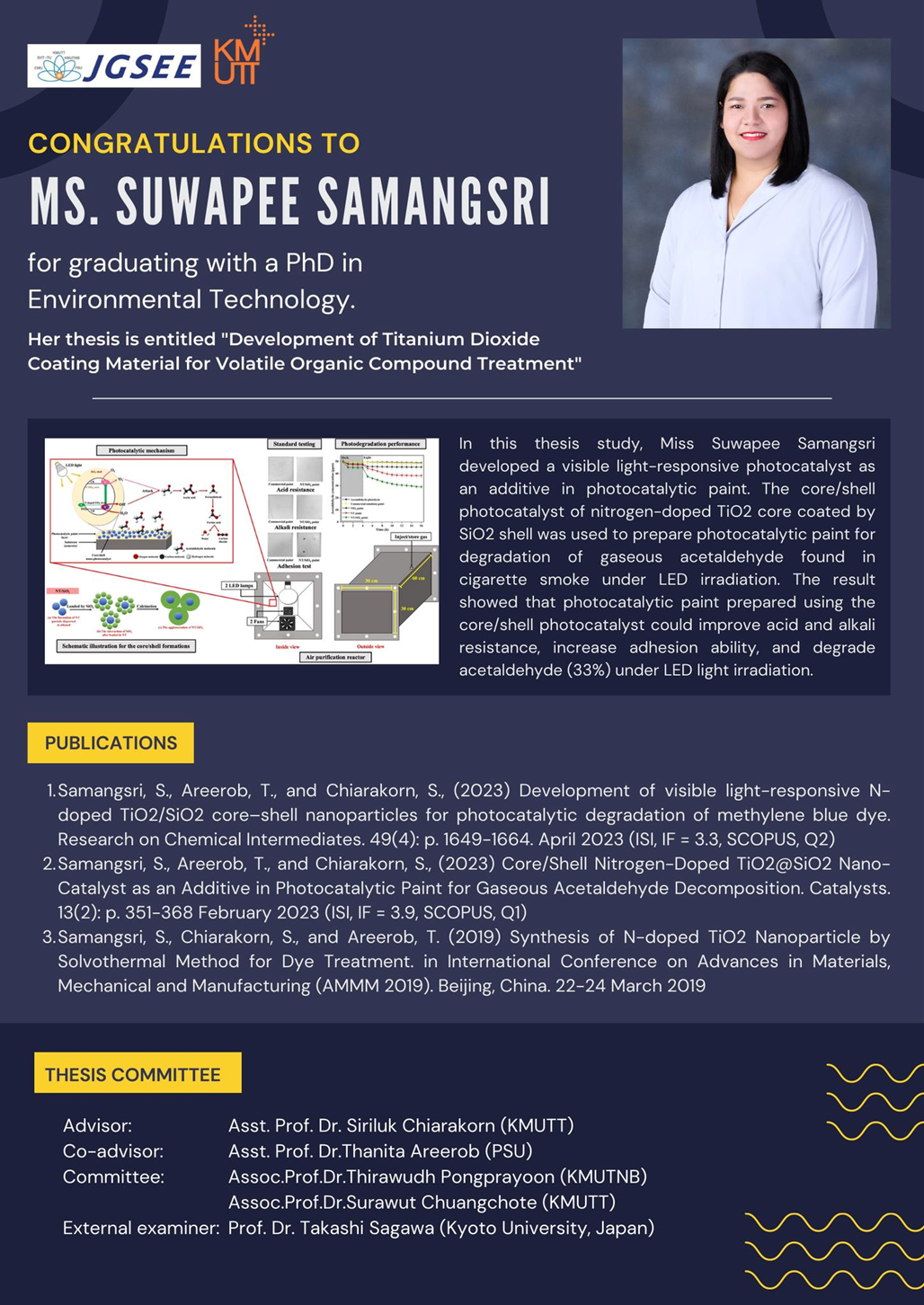
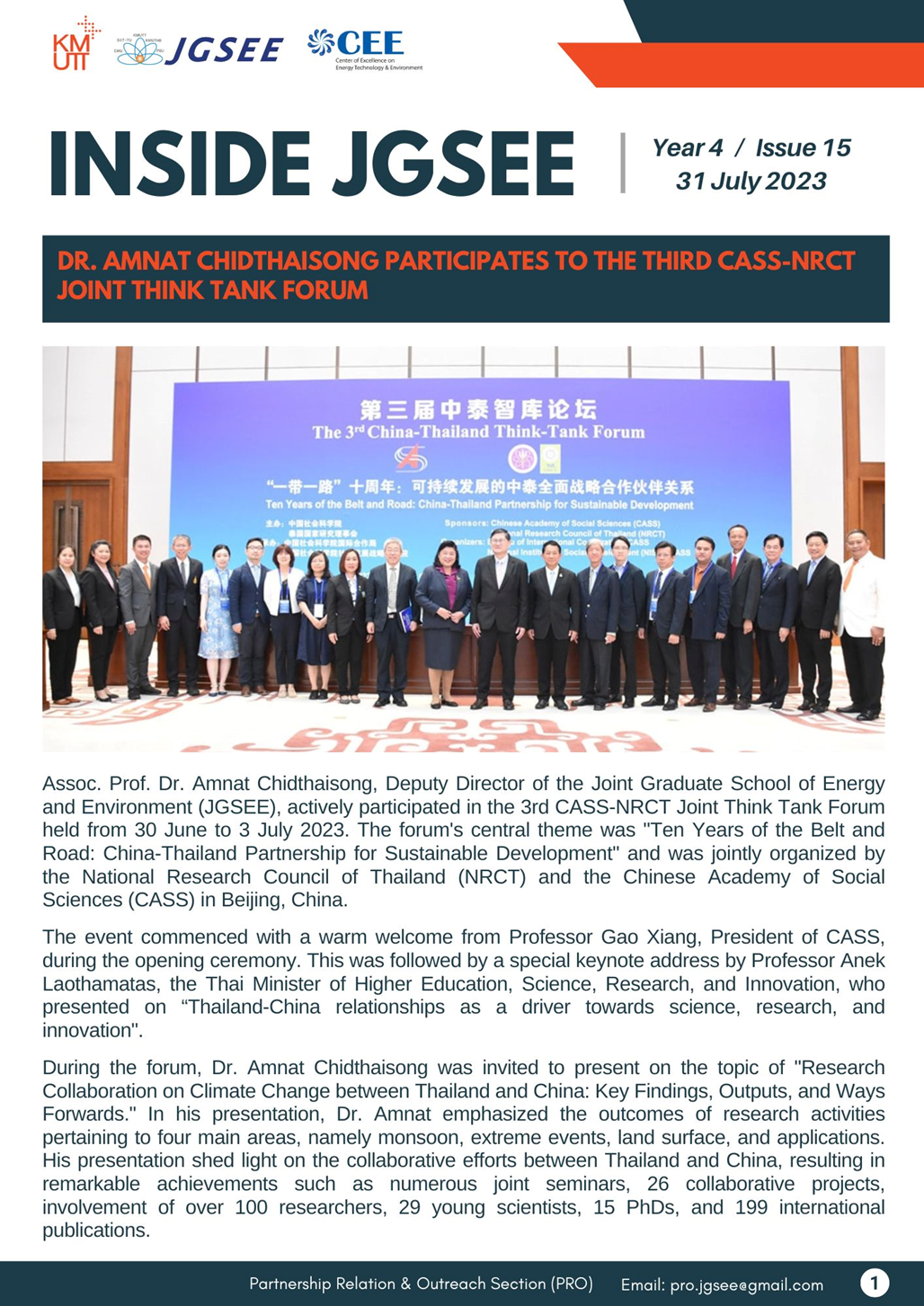
Assoc. Prof. Dr. Amnat Chidthaisong, Deputy Director of the Joint Graduate School of Energy and Environment (JGSEE), actively participated in the 3rd CASS-NRCT Joint Think Tank Forum held from 30 June to 3 July 2023. The forum’s central theme was “Ten Years of the Belt and Road: China-Thailand Partnership for Sustainable Development” and was jointly organized by the National Research Council of Thailand (NRCT) and the Chinese Academy of Social Sciences (CASS) in Beijing, China.
The event commenced with a warm welcome from Professor Gao Xiang, President of CASS, during the opening ceremony. This was followed by a special keynote address by Professor Anek Laothamatas, the Thai Minister of Higher Education, Science, Research, and Innovation, who presented on “Thailand-China relationships as a driver towards science, research, and innovation”.
During the forum, Dr. Amnat Chidthaisong was invited to present on the topic of “Research Collaboration on Climate Change between Thailand and China: Key Findings, Outputs, and Ways Forwards.” In his presentation, Dr. Amnat emphasized the outcomes of research activities pertaining to four main areas, namely monsoon, extreme events, land surface, and applications. His presentation shed light on the collaborative efforts between Thailand and China, resulting in remarkable achievements such as numerous joint seminars, 26 collaborative projects, involvement of over 100 researchers, 29 young scientists, 15 PhDs, and 199 international publications.

On 24 June 2023, Prof. Navadol Laosiripojana, Director of JGSEE, and Assoc. Prof. Dr. Amnat Chidthaisong, Deputy Director of JGSEE, joined the NRCT Open House 2023 on Natural Resources and Environment. The event was held at the National Research Council of Thailand (NRCT) and broadcast live on Facebook and via Zoom.
Dr. Wiparat De-ong, Executive Director of the NRCT, presided over the event and presented its objectives, which were to communicate the research and innovation framework for the 2024 fiscal year and guidelines for the preparation of research proposals. This was followed by a keynote address by Prof. Sanit Aksornkoae, Chairman of the Office of the National Economic and Social Development Council, on “The Milestone of the Thirteenth National Economic and Social Development Plan (2023-2027)” with an emphasis on natural resources and the environment.
As part of a panel discussion, Dr. Amnat was invited to deliver a presentation on “The 2024 Research and Innovation Frameworks on Natural Disasters and Climate Change”. His talk focused on detailing the research frameworks, which are divided into the following three groups:
-
natural disaster management (earthquake and tsunami, landslide, flood and drought, storm, and heat waves),
-
climate change, ecosystems, and biodiversity, and
-
climate change impacts on water security in urban and industrial areas.
Other speakers included Dr. Wijarn Simachaya from the Thailand Environment Institute, Dr. Kwarnrudee Chotichanathaweewong from NRCT, Dr. Supat Wangwongwatana from Thammasat University, and Prof. Padermsak Jarayabhand and Assoc. Prof. Dr. Suttha Khaodhiar from Chulalongkorn University.

JGSEE Contributes to ASEAN Energy & Utilities Digital Week (AEUDW)
On 6 July 2021, JGSEE-CEE-KMUTT co-organised with Informa Markets two webinars:
(1) ASEAN Renewable Energy Outlook
and
(2) ASEAN Bioenergy.
1) ASEAN Renewable Energy Outlook Webinar
In the morning of 6 July 2021, the ASEAN Renewable Energy Outlook webinar highlighted the challenges and opportunities for renewable energy integration, energy transition, bioenergy and policy through expert presentations and a panel discussion on “The Way Towards Achieving Sustainable and Affordable Energy in ASEAN.”
The webinar featured experts from ASEAN and international energy agencies. The event was moderated by Dr. Weerawat Chantanakome, Ministry of Energy, Thailand.
At the start of the webinar, welcome remarks were delivered by Dr. Nuki Agya Utama, Executive Director, ASEAN Centre for Energy. Dr. Utama also delivered a special talk on “ASEAN Renewable Energy Status, Future Trend and their Role in Energy Transformation.”
This was followed by 5 plenary presentations on topics covering solar, wind, bioenergy, power and smart grids, as follows:
-
Solar and Wind: Challenges and Opportunities, Mr. John Bruce Wells, USAID Vietnam Low Emission Energy Program II (V-LEEP II).
-
Bioenergy and Biofuels: status and their Role in ASEAN Energy Mix, Dr. Supatchalee Sophonthammaphat, Department of Alternative Energy Development and Efficiency (DEDE), Ministry of Energy, Thailand, and Dr. Robert Edyvean, Department of Chemical and Biological Engineering, University of Sheffield, UK.
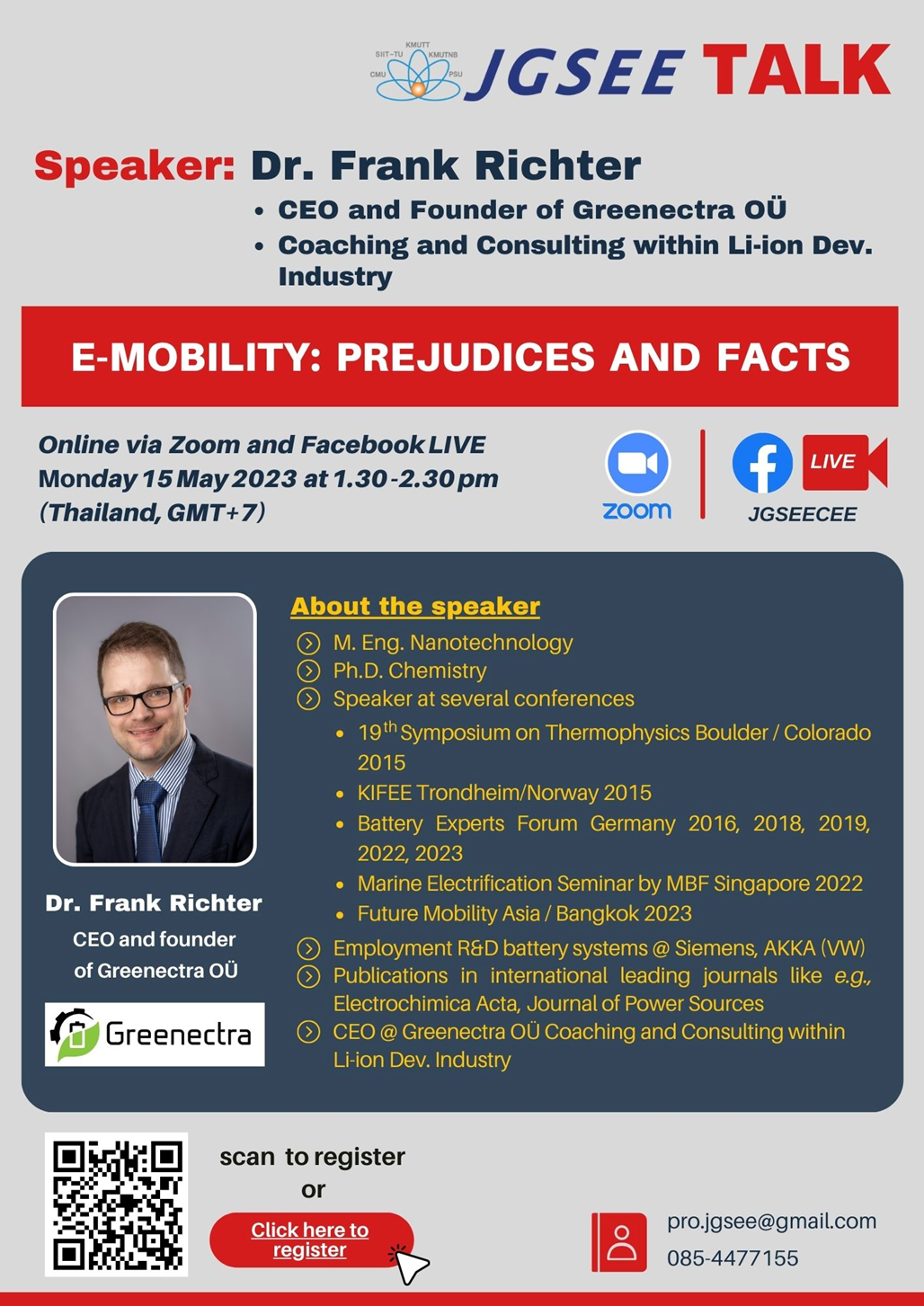
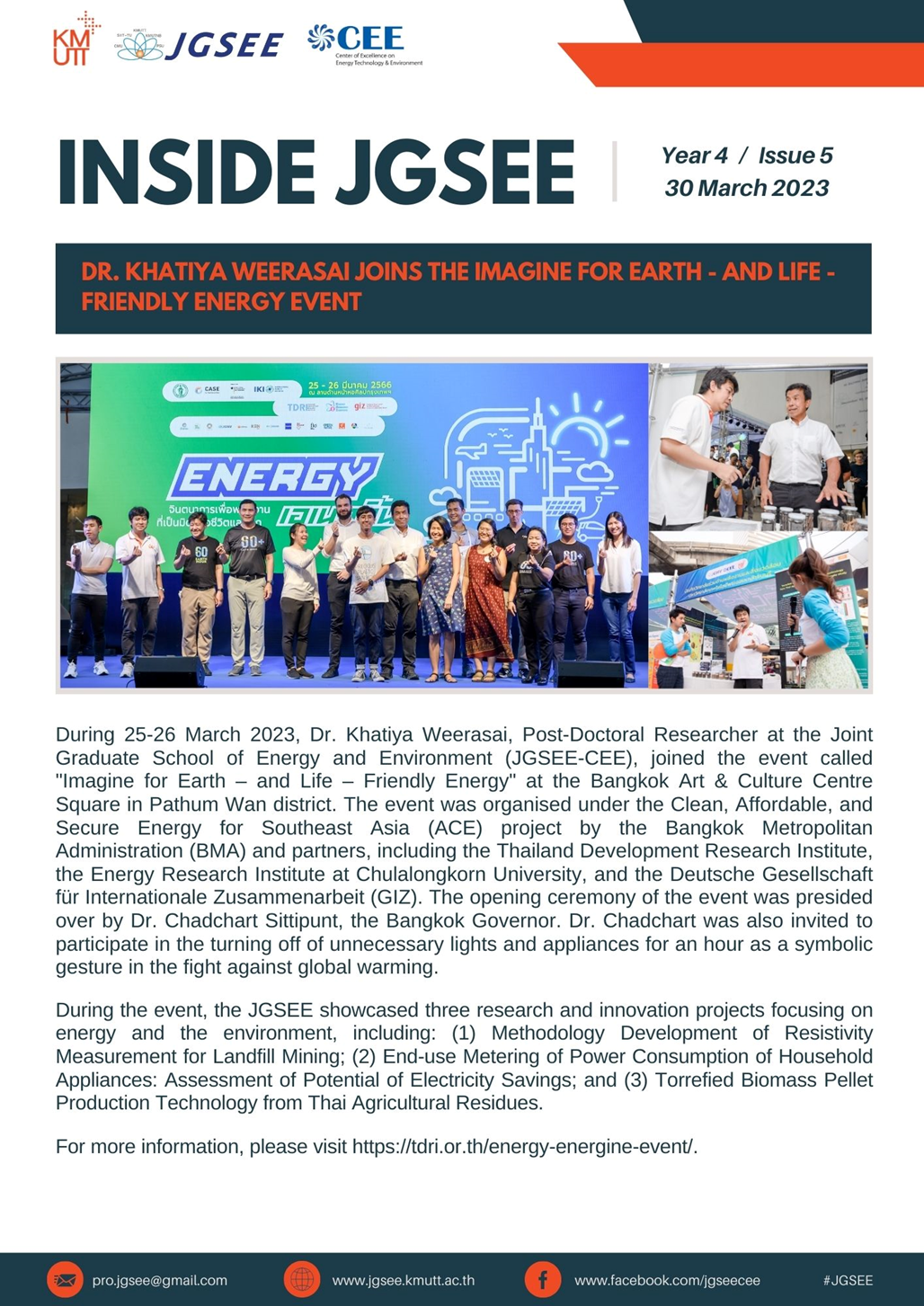
During 25–26 March 2023, Dr. Khatiya Weerasai, Post-Doctoral Researcher at the Joint Graduate School of Energy and Environment (JGSEE-CEE), joined the event called “Imagine for Earth – and Life – Friendly Energy” at the Bangkok Art & Culture Centre Square in Pathum Wan district. The event was organised under the Clean, Affordable, and Secure Energy for Southeast Asia (ACE) project by the Bangkok Metropolitan Administration (BMA) and partners, including the Thailand Development Research Institute, the Energy Research Institute at Chulalongkorn University, and the Deutsche Gesellschaft für Internationale Zusammenarbeit (GIZ). The opening ceremony of the event was presided over by Dr. Chadchart Sittipunt, the Bangkok Governor. Dr. Chadchart was also invited to participate in the turning off of unnecessary lights and appliances for an hour as a symbolic gesture in the fight against global warming.
During the event, the JGSEE showcased three research and innovation projects focusing on energy and the environment, including:
(1) Methodology Development of Resistivity Measurement for Landfill Mining;
(2) End-use Metering of Power Consumption of Household Appliances: Assessment of Potential of Electricity Savings; and
(3) Torrefied Biomass Pellet Production Technology from Thai Agricultural Residues.
For more information, please visit https://tdri.or.th/energy-energine-event/
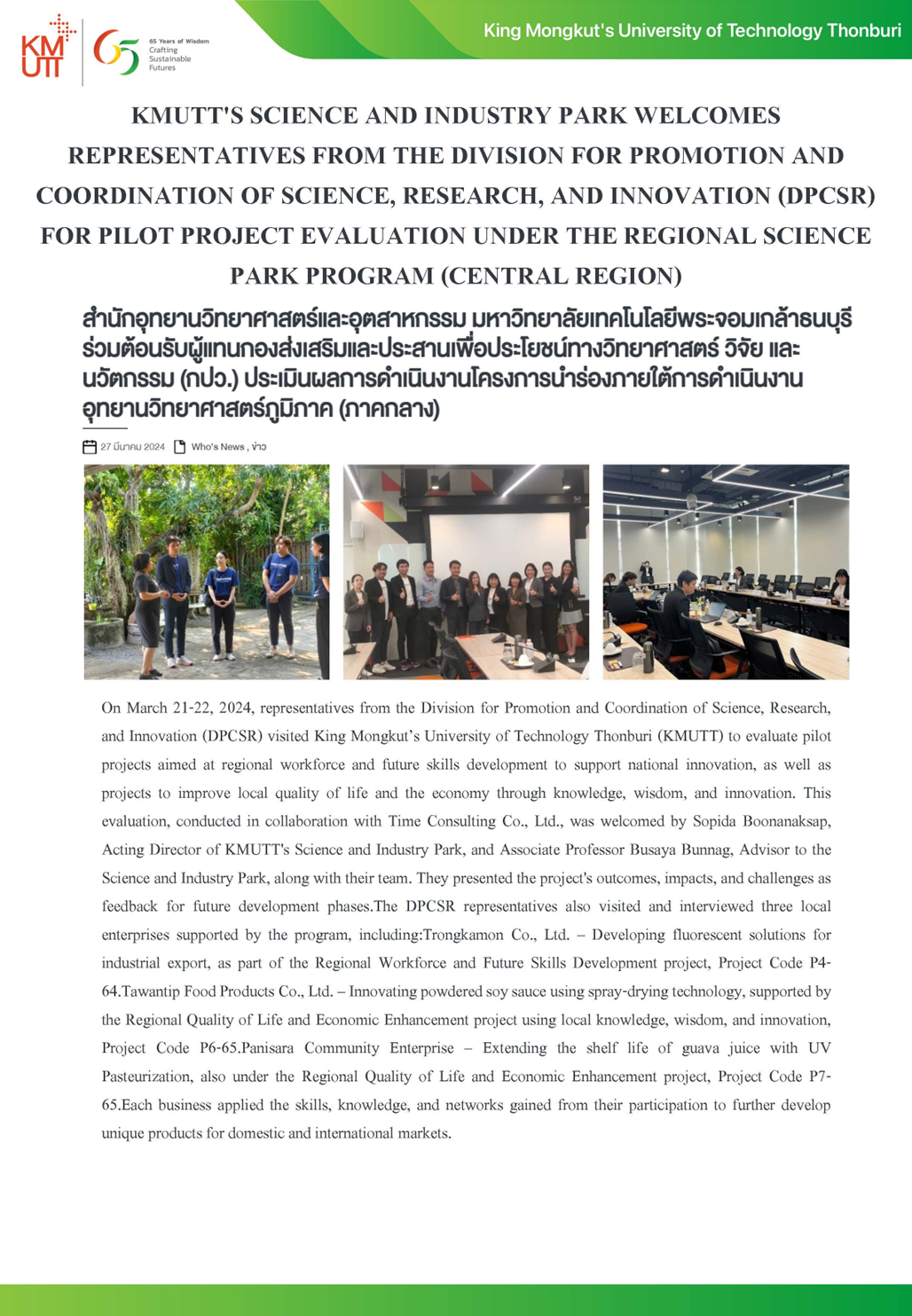
KMUTT’S SCIENCE AND INDUSTRY PARK WELCOMES REPRESENTATIVES FROM THE DIVISION FOR PROMOTION AND COORDINATION OF SCIENCE, RESEARCH, AND INNOVATION (DPCSR) FOR PILOT PROJECT EVALUATION UNDER THE REGIONAL SCIENCE PARK PROGRAM (CENTRAL REGION)
On March 21–22, 2024, representatives from the Division for Promotion and Coordination of Science, Research, and Innovation (DPCSR) visited King Mongkut’s University of Technology Thonburi (KMUTT) to evaluate pilot projects aimed at regional workforce and future skills development to support national innovation, as well as projects to improve local quality of life and the economy through knowledge, wisdom, and innovation.
This evaluation, conducted in collaboration with Time Consulting Co., Ltd., was welcomed by Sopida Boonanaksap, Acting Director of KMUTT’s Science and Industry Park, and Associate Professor Busaya Bunnag, Advisor to the Science and Industry Park, along with their team. They presented the project’s outcomes, impacts, and challenges as feedback for future development phases.
The DPCSR representatives also visited and interviewed three local enterprises supported by the program, including:
Trongkamon Co., Ltd. – Developing fluorescent solutions for industrial export, as part of the Regional Workforce and Future Skills Development project, Project Code P4-64.
Tawantip Food Products Co., Ltd. – Innovating powdered soy sauce using spray-drying technology, supported by the Regional Quality of Life and Economic Enhancement project using local knowledge, wisdom, and innovation, Project Code P6-65.
Panisara Community Enterprise – Extending the shelf life of guava juice with UV Pasteurization, also under the Regional Quality of Life and Economic Enhancement project, Project Code P7-65.
Each business applied the skills, knowledge, and networks gained from their participation to further develop unique products for domestic and international markets.
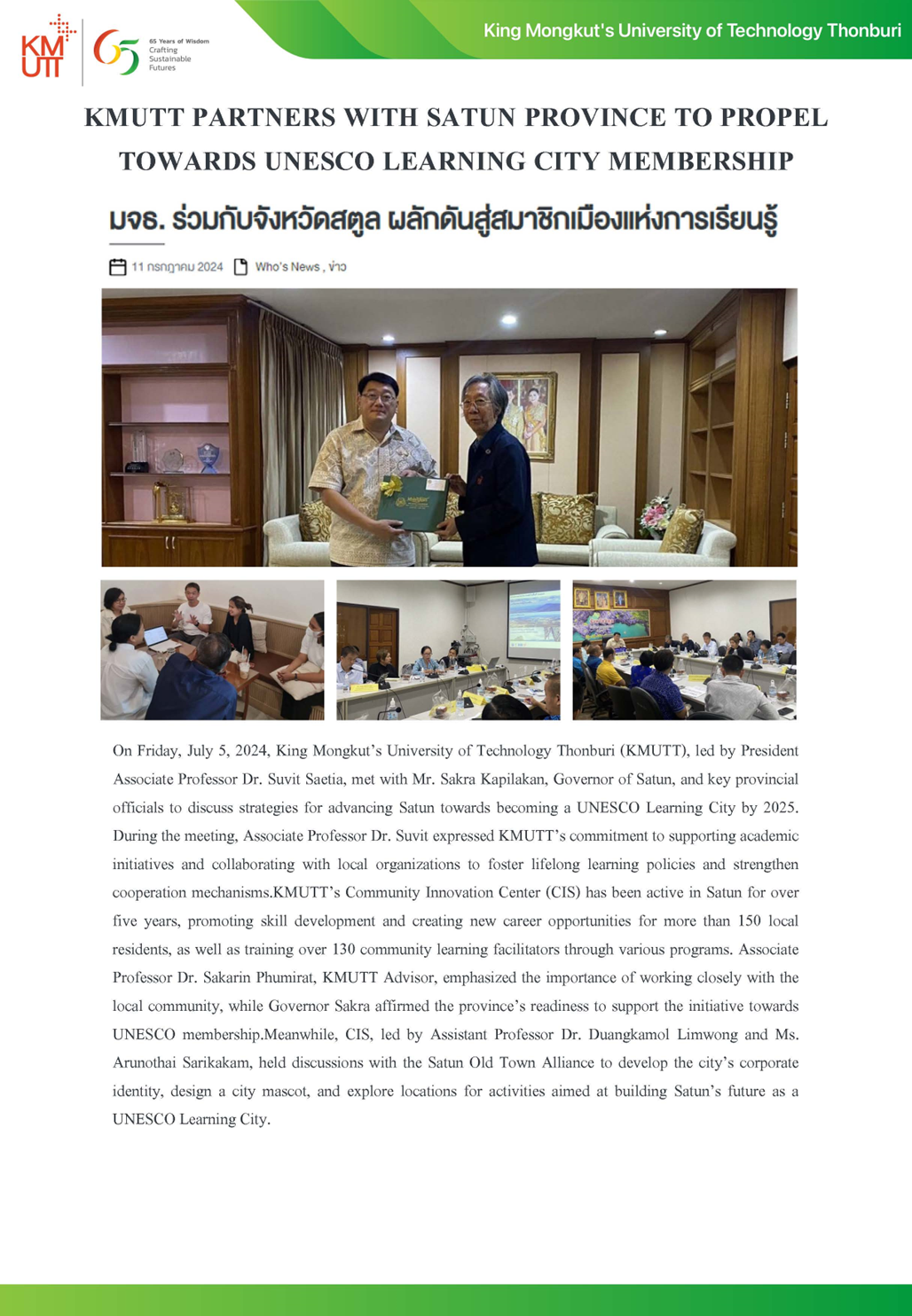
4. Neutral platform to discuss issues
KMUTT’s Commitment to Free Expression and Political Dialogue
At King Mongkut’s University of Technology Thonburi (KMUTT), the university upholds the fundamental right to free speech and political expression as essential components of a democratic society. In line with this belief, KMUTT grants its students the freedom to organize political forums and spaces for political discussion within the university, particularly during periods of political crises. The university recognizes the value of open dialogue and encourages an environment where students can engage in thoughtful, respectful discussions on political issues affecting society.
KMUTT views political speech as a fundamental right that should be protected, allowing students to express their views and participate in constructive discourse. By providing students with the platform to organize discussions, forums, and events, KMUTT ensures that the voices of its community are heard and that students can exercise their rights to speak freely and engage in critical conversations about the future of their country.
The university’s stance on political dialogue reflects its broader commitment to fostering critical thinking, civic engagement, and social responsibility among its students. KMUTT believes that by creating opportunities for students to discuss important political and social issues, they will be better equipped to understand diverse perspectives, promote active citizenship, and contribute to positive societal change.
Through this approach, KMUTT not only supports its students’ right to free expression but also encourages them to develop a deeper understanding of the political landscape and the role of young people in shaping the future of their country. The university remains steadfast in its commitment to creating an academic environment where freedom of speech, intellectual exchange, and democratic principles are valued and upheld.



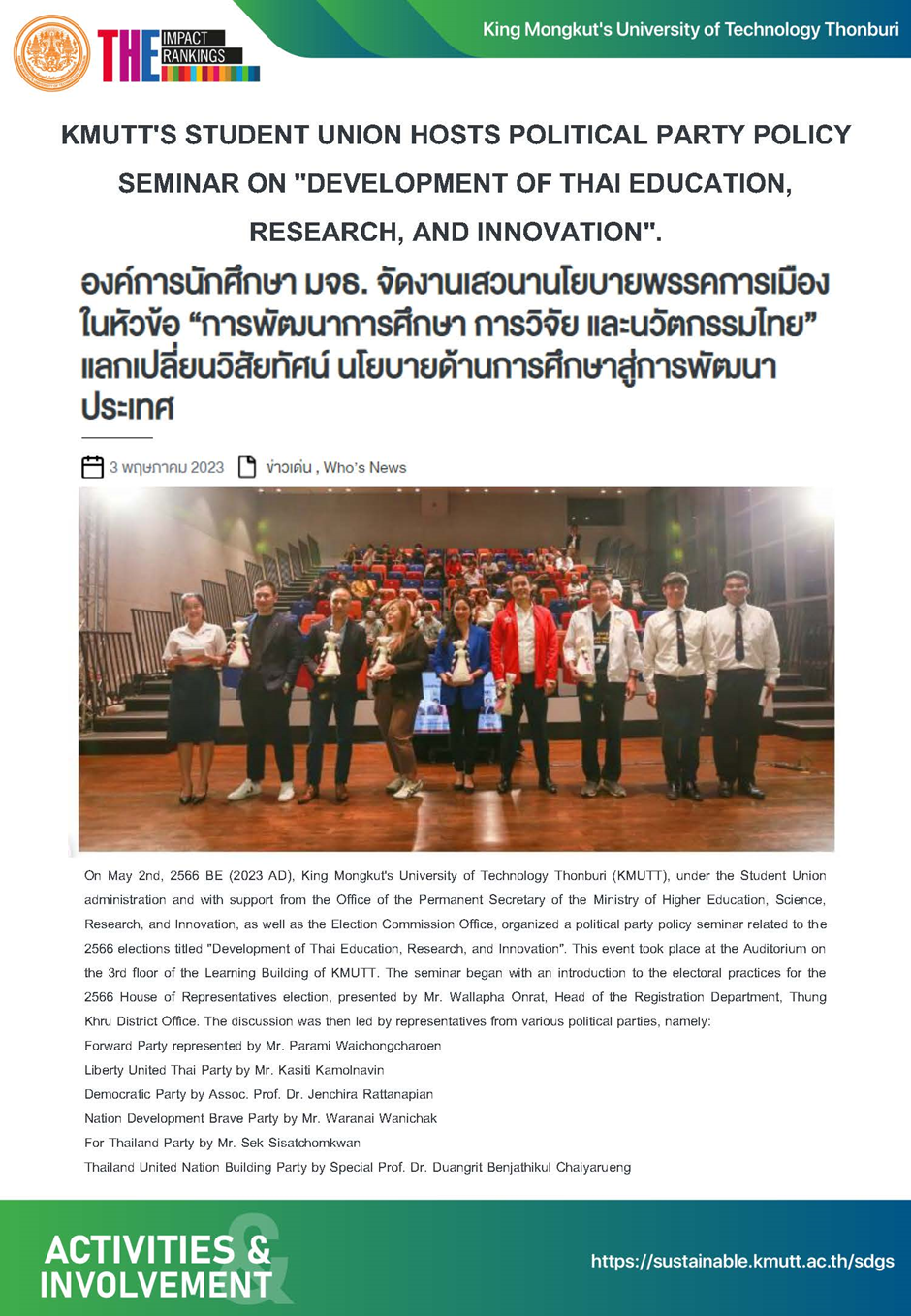
SDG 16: Peace, Justice and Strong Institutions
Overview of Operations at King Mongkut's University of Technology Thonburi (KMUTT)
Inclusive Governance
University Council includes elected representatives from faculty, staff, and students for equitable policy.
Code of Conduct (2011)
Sets standards for morality, fairness, rights, and ethics, with strict penalties for violations.
Anti-Corruption Measures
Includes procurement transparency, whistleblower channels, and conflict-of-interest prevention.
Stakeholder Participation
Ensures efficient operations via public policy announcements and diverse opinion channels.
Academic Freedom
Protected through OBEM guidelines and regulations, facilitating research and teaching choices.
Administration Policy
President's policy (2019) emphasizes honesty, transparency, morality, and professionalism.
ITA Knowledge Seminar
Held in May 2025 for 140+ personnel to improve integrity and transparency assessment.
Research Ethics Training
Workshops on Plagiarism and Peer Review Ethics (Sep 2024) attended by 480 participants.
Strategic Plan Seminar
Brainstorming session (2022) for executives on Strategic Plan No. 13 and HR policies.
Asset Use Compliance
Activity in Nov 2022 covering guidelines for proper asset usage and transparency.
EIT Surveys (2024-25)
External Integrity and Transparency Assessment surveys inviting stakeholder feedback.
Ethics & Transparency
Research supports SDG 16 through a strong focus on ethics, policy frameworks, and compliance.
Policy-Focused Research
Collaborations with government on frameworks for climate change, water security, and ecosystems.
Science Park Projects
Evaluated pilot projects (2024) for regional workforce skills and quality of life enhancements.
Climate Collaboration
Thailand-China collaboration (2023) covering 26 projects and 199 publications on climate resilience.
Innovation for Society
PhD research (2023) on photocatalysts for VOC treatment, contributing to safer environments.
ITA Score 94.41 (Level A)
Achieved in fiscal year 2025, reflecting high standards of integrity and transparency.
92% Policy Compliance
Percentage of policies reviewed and found compliant with SDG 16 standards (+7% increase).
Government Advisory
35 personnel served as government advisors (2025), including Vice Minister roles.
Training Completion
87% completion rate for ethics/anti-corruption training (+12% increase).
Grievance Resolution
148 cases resolved via grievance channels (+18% increase), ensuring justice.
Open Data
Published 36 open data sets to promote transparency and public access to information.
Governance
Establishes principles of good management, including accountability, transparency, and the rule of law.
Systematic Governance (HR)
Focuses on transparency, fairness, and justice within the university's human resources systems.
Core Values: Integrity
Emphasizes the core value of upholding what is right and being socially responsible in all actions.
Safety Policy
Ensures a safe and secure environment for all, contributing to peaceful and inclusive communities.

